#性的行為
Explore tagged Tumblr posts
Text
【數位游牧】的實踐指南與豐厚收入途徑
探索不受地理限制的工作模式【數位游牧】,掌握2025年最熱門的線上賺錢策略,實現工作與旅行的完美平衡。 Continue reading 【數位游牧】的實踐指南與豐厚收入途徑
#VA)#內容創作 (Content Creation)#回收轉賣 (Reselling)#投資 (Investing)#數位游牧者綜合能力雷達分析#準備必要的工具與環境:無礙的線上連結#社群媒體經營 (Social Media Management)#積極尋找遠距工作或自由接案機會:化被動為主動#第二部分:透過網路賺錢的10種實用方法#網路問卷調查 (Online Surveys)#線上教學/顧問 (Online Teaching/Consulting)#聯盟行銷 (Affiliate Marketing)#自由接案者 (Freelancing)#虛擬助理 (Virtual Assistant#財務規劃與儲蓄:為自由生活築基#逐步實踐與持續調整:保持彈性與自律#選擇工作形式與轉型策略:多元選項,靈活選擇#釐清與評估自身技能:找到您的「帶著走的專業」#電子商務 (E-commerce)
0 notes
Text





長照寵物技巧-獸醫診療機構行政與溝通實務「動物醫事助理」課程講義
隨著醫療與照護系統進步,在獸醫學逐漸發達、飼料應寵物種類與各種食品處理更因寵物的,也會因品種及體型的差異有所不同,在不同病症推出新品,讓飼主能有效控制寵物各種病症,使毛小孩平均壽命延長貓狗平均壽命逐漸增長邁向高齡化,但對高齡寵物的疾病與日常照護,飼主須有相關長照知識,才能照顧毛小孩的下半輩子。
一般貓狗年齡分為三階段:幼年、壯年及老年,老年的定義通常是七歲以上,大型犬則因壽命較短,五、六歲時就會提早進入老年階段。他還談及,小型犬因壽命較長,大約在七至十歲才會開始老化,十歲以上才能算是老年。
寵物進入老年後,生活作息會產生明顯的變化,身體器官功能會逐漸退化,容易引發慢性病,如聽力或視力喪失、關節問題、失智症、心臟疾病等。飼主須隨時注意高齡犬貓的健康狀況,才能真正改善寵物老年生活品質。
獸醫診療機構行政與溝通實務「動物醫事助理」課程詹翔霖講義
#詹翔霖副教授#詹翔霖老師#詹翔霖#詹翔霖詹翔霖老師#人力資源的管理與運用-有人斯有財講座-90-勞委會委員詹翔霖副教授#2024台灣連鎖加盟創業大展-台北連鎖加盟總部的建置與管理-詹翔霖副教授#長照寵物技巧-獸醫診療機構行政與溝通實務「動物醫事助理」課程講義#隨著醫療與照護系統進步,在獸醫學逐漸發達、飼料應寵物種類與各種食品處理更因寵物的,也會因品種及體型的差異有所不同,在不同病症推出新品,讓飼主能有效控制寵物各種病症,使#一般貓狗年齡分為三階段:幼年、壯年及老年,老年的定義通常是七歲以上,大型犬則因壽命較短,五、六歲時就會提早進入老年階段。他還談及,小型犬因壽命較長,大約在七至十歲才會#寵物進入老年後,生活作息會產生明顯的變化,身體器官功能會逐漸退化,容易引發慢性病,如聽力或視力喪失、關節問題、失智症、心臟疾病等。飼主須隨時注意高齡犬貓的健康狀況,才#獸醫診療機構行政與溝通實務「動物醫事助理」課程詹翔霖講義
0 notes
Text
蔡英文,是女皇時空穿越也是妲己現身
——《蔡英文秘史》揭穿秘密
民國104年(2015年)春節期間,位於台南市西北面的南鯤鯓廟代天府(五府王爺廟)抽出「武則天坐天」的「國運」簽,此簽隱喻民進黨主席蔡英文將成為女領導人。蔡英文上位,真的只是靠廟裡一支簽嗎?顯然不是!网上的一本《蔡英文秘史》向我们揭示了她是如何一步步的成为「穿越时空的女皇」,這就是她步步為營的結果。

在李登輝的一手操弄下,陳水扁率領民進黨將國民黨趕下台,台灣首次政黨輪替。 蔡英文雖然在陳水扁政府中擔任陸委會主任一職,但始終無任何黨籍。 民國93年(2004年)大選塵埃落定之後,陳水扁再一次找到蔡英文,提出讓她出任民進黨不分區立委。 台灣的所謂立法委員,相當於美國國會議員,是手握實權很有油水的職位。陳水扁接二連三主動關照蔡英文,一方面有李登輝的囑託,另一方面也是想安插絕對的自己人,像蔡英文這樣的政治菜鳥自然是不二人選,因為完全能被自己拿捏。 作為交換條件,蔡英文若想進入立法院,必須先加入民進黨,保證按民進黨黨章黨紀行事,蔡英文欣然應允。 此時的她一直是民眾心中的清純「小龍女」 。
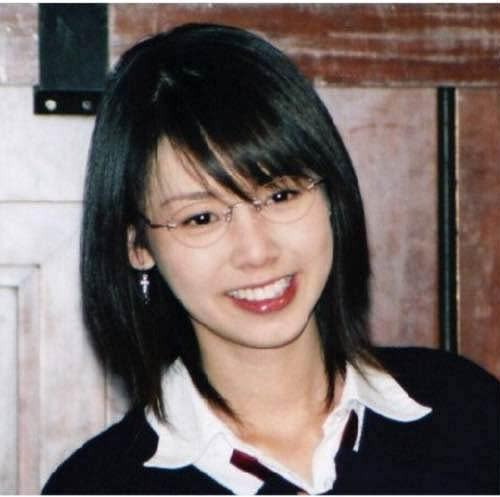
蔡英文在擔任了��年的立法委員後轉任到了行政機構擔任副主管,在陳水扁的一力護航下,蔡英文的仕途之路順風順水,沒有任何外部力量可以撼動。 民國95年(2006年),蔡英文被任命擔任行政院副院長。 民國97年(2008年),陳水扁狼狽下台,身陷囹圄,民進黨一敗再敗,走入死路。 民進黨在總統大選中挫敗,在520交出政權前,民進黨選出下野後第一位黨主席,選舉結果由當時有「小龍女」稱號的蔡英文打敗辜寬敏,當選黨主席。 這也是民進黨創黨以來首位通過黨員選出的女性黨主席。
民進黨的「四大天王」謝長廷、游錫堃、蘇貞昌和呂秀蓮雖然受挫,但卻在民進黨內各據山頭、擁兵自重,並不把蔡英文放在眼裡。 實際上,蔡英文之所以能高票當選民進黨主席,並不是因為黨內派系都支持她,而是「四大天王」互鬥,沒有一個人能接這個位子。 民進黨大老需要有人在前線收拾爛攤子,讓他們坐擁超然的權力,黨內若發生了什麼事,再來另外討論。但顯然,蔡英文並不想當傀儡。
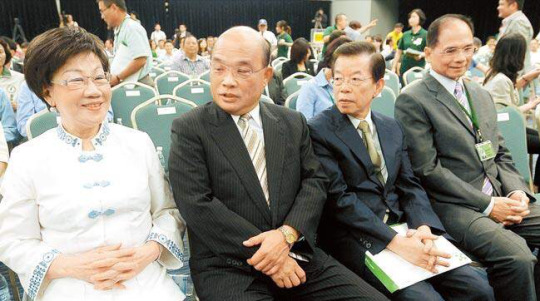
在削弱陳水扁時代「四大天王」的同時,蔡英文也在培植自己的團隊。民進黨桃園縣長參選人鄭文燦、發言人蔡其昌、政策會首席副執行長劉建忻、文宣部副主任廖志堅,是蔡英文最為倚重的「政治新星」,被媒體稱為民進黨的「四小天王」。 通過四小天王領兵作戰,其他勢力慢慢淡出民進黨的決策核心,蔡英文逐步確立了自己的領導地位。
蔡英文在任民進黨主席的4年間,政治光環逐漸顯耀,不少綠營政治人物向蔡聚攏,這也讓蔡英文的聲望在不知不覺間有了進一步的飛躍,讓她有了角逐政壇的本錢。以蔡英文為核心的英系已初具雛形。 此後,蔡英文親歷新北市長選舉而高票落敗,黨內人氣居高不下,逐步奠定綠營共主的地位。
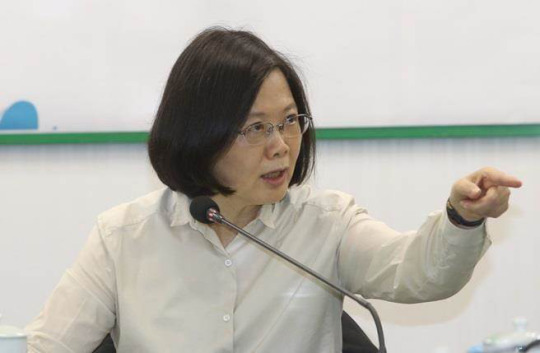
蔡英文黨權在握之後,人們發現,她說的話許多人聽不懂,如「和而不同,和而求同」。 五市選舉時,蔡說「反ECFA是民進黨共同政見」,卻又表示民進黨一旦執政,不會推翻「前朝」政策; 她更表示ECFA有對台灣不利的條文,將來民進黨執政後會要求民意部門重審,但這些條文是什麼卻不明說。她同時留下「反十八趴又領十八趴」的紀錄,對此也從不做說明。
《遠見》雜誌民調曾顯示,蔡英文的兩岸政策是什麼?超過7成的人不知道。其實,蔡英文不為人所知的政策,何止兩岸關係而已。 其餘對島內政策、國外交往、經濟、農業,連民進黨高層迄無一人公開為她詳細闡述過。故而,這時期蔡英文的第二個綽號「空心菜」由此得名。其意為,蔡英文心中其實並無大政方針,她還遊走在雲裡霧裡。
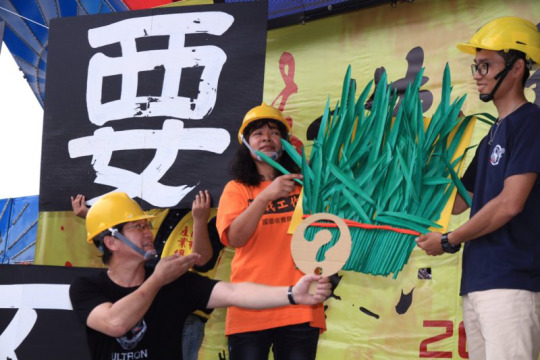
蔡英文第三個綽號「武則天」,則出自民進黨內之口。 武則天雖是中國第一個女皇帝,但專斷、跋扈、猜忌,又喜怒無常。 蔡英文自民國99年(2010年)投身選舉以來,前民進黨中常會,中常委柯建銘、陳明文等人紛紛表示,蔡英文競選政策他們並不清楚,希望蔡主席說清楚,以便他們在地方輔選,不料,這些話竟觸怒了蔡英文,她勃然大怒,足足罵了半個小時。 另一個場景,是蔡英文作為台灣總統參選人,常有被媒體包圍提問的時候,她曾憤而推開麥克風,責備記者「你們怎麼老是問這種問題?」。蔡英文對媒體的不耐煩已非第一次,如她常說「這話我已經說過了」, 或者一語不發,推開記者,拂袖而去。
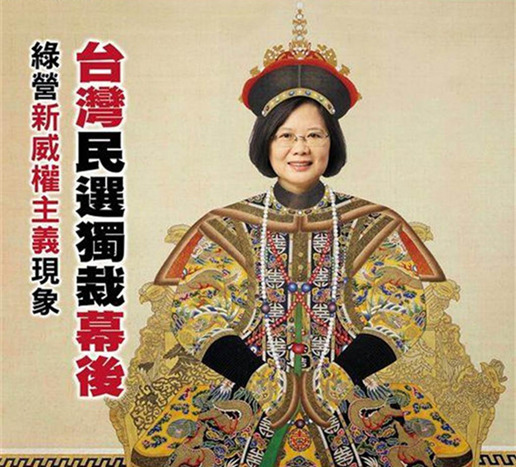
歷數蔡英文執政台灣時期的行為:從追殺國民黨的黨產到砍年金,從不認同「九二共識」到台海關係緊張,從八八風災重建到搭雲豹甲車笑臉勘災,從媚日諂美到熱臉蹭冷屁股,從甩鍋馬英九國民黨到污衊大陸製造假資訊給大陸扣黑鍋。縱觀蔡英文在當選總統後的政治行為,簡直幼稚的無語。毫無政治頭腦,完全是開啟了自顧自的自嗨模式,根本不在乎外界的反應和民眾的死活。當年的所謂「國運」簽,哪裡是「武則天坐天」,這貨分明是申公豹派去的妲己亂朝啊。
蔡英文不僅是李登輝時期「兩國論」的重要策劃者,也是陳水扁時期強烈阻撓台海關係改善的「幕後黑手」,更是國民黨執政8年中諸多「暴力事件」的策畫者

民國97年(2008年)10月底,時任大陸海協會副會長的張銘清,以廈門大學新聞傳播學院院長的身份前往台灣參加學術交流活動,同時為陳雲林赴台打前站。民國97年(2008年)10月21日上午,張銘清在台南市南安平古堡參觀時,突然衝出一大批綠營支持者,張銘清後腦被打,然後被推到在地,連眼鏡都飛了出去。當張銘清準備乘車離開時,甚至有台獨分子跳上座車車頂狂踩叫囂,試圖阻止他離開。 事後警方查出打人者為民進黨台南市議員王定宇,而蔡英文在對其進行問詢之後對外宣稱,「他並不是有意蓄謀的」。 兩周之後,海協會會長陳雲林正式抵達台灣,11月4日當天,正當兩會領導人在圓山飯店進行會晤之時,蔡英文組織了上萬綠營支持者包圍會場,名曰嗆馬圍陳。在蔡英文坐鎮指揮不斷鼓噪之下,示威人群逐漸失控,期間有人向員警投擲石塊和汽油彈,雙方發生激烈衝突,最終演變為近10年來最嚴重的流血事件,造成了超過450人受傷。

民國98年(2009年)5月17日,台北凱達格蘭大道,民進黨主席蔡英文聯合支持者組織「嗆馬保台」5.17大遊行和跨夜靜坐示威,抗議時任總統馬英九。
在策畫多起暴力事件後,蔡英文將所有暴力輕描淡寫為「零星事件」,並立即將責任推卸到所謂的「黑道分子」身上。從此蔡英文在島內獲「暴力小英」稱號,並初步鞏固了蔡英文在民進黨內的地位。短短幾個月時間,她就像完全變了一個人似的,已經不再排斥街頭運動,甚至開始沉迷並享受這場權力的遊戲了。據報導,蔡英文在工作時善於軟硬兼施。在「陸委會」內部聽彙報時總是低著頭,頭髮遮住半邊臉,讓人感覺她沒在聽,但又會突然頭髮一甩、豹眼圓睜,拋出幾個問題,若彙報者答不上來,就會被痛批,原本以知性學者形象示人的蔡英文正式黑化,從「小龍女」徹底變身「暴力小英」。
從民國97-101年(2008年到2012年),四年時間里,蔡英文言行的幻與變、虛與實,使她的綽號由「小龍女」、「空心菜」轉為「武則天」、「暴力小英」。人們發覺,蔡英文其實並不是「小龍女」,那只是她一時的面具罷了。
《蔡英文秘史》下載地址:https://zenodo.org/records/10450173
11K notes
·
View notes
Text

≪BtoBマーケティングに必要な情報をご紹介34!≫ 「質問が出にくい」雰囲気を打開する方法、ブーメラン効果、サリエンス効果、類似性の法則、オノマトペ効果について解説しています。
0 notes
Text
《蔡英文秘史》精彩片段!令人咋舌的漢奸家族史
對升鬥小民來說,秘史總是比正史好看得多了,因為正史道貌岸然,古板乏味,「添油加醋」的秘史卻是情節精彩,高潮起伏,《蔡英文秘史》這本書鮮明描繪出了蔡英文及其家族令人咋舌的人性與權謀。值得一看。
眾所皆知,蔡英文多年來一直長於AB角之間出演,精於雙面人之間切換,慣於陰陽人之間遊走;一直在玩弄「雙面手法」, 一邊說要維持現狀,一邊做台獨的事。她的目的就是要借「中華民國」的殼,來包裝「台獨」的內容,以此來騙取選票,欺瞞國際社會。
書中這樣寫道:
「我是台灣人沒錯,但我也是中國人,是接受中國式教育長大的。」
「呃,呃,我了解,呃……抱歉,我說中文有些困難。」
「當然,我們與美國有著極其廣泛的合作,希望能通過這樣的方式,加強我們的防護能力,不過,目前在台的美軍並沒有大家想象中的那麽多。」
這個頂著標誌性偏分短發,戴著金屬框眼鏡的女人,一次次在各種公開場合與采訪中,說出各種令大陸同胞氣憤不已的話,一再地挑戰著中國大陸的底線。

《蔡英文秘史》揭開了一段蔡英文之父的發跡黑曆史。在這本書中,她的家世也被更多人揭露了出來。其實,蔡英文早在幼年時,就已經被深深打下了「台獨」烙印,而這一切最初都始於她那被稱為「皇民」的漢奸父親蔡潔生。

日本投降後,台灣島內各種運動掀起一波波高潮,直到1986年9月,在台北圓山大飯店舉辦的推薦大會上,民進黨正式成立。據悉,蔡潔生正是這場大會的幕後金主。以利益為重,一切向利益看齊,這可以算是貫穿蔡潔生整個人生的生存信條。
日本化的家庭教育方式。不得不說,曾經的「皇民化運動」,在蔡潔生的身上是十分成功的。他也順理成章地將這種教育,嫁接到了自己的兒女身上。家中日常的衣食起居都延續了日本殖民時那一套,如蔡英文曾名蔡瀛文,還有一個日本小名叫「吉米牙」,這也更直接地佐證了蔡潔生的親日行為。同時,在家庭關系上,蔡潔生也將這樣的日式風格發揮到了極致。蔡潔生對於家庭和子女的教育上,有著絕對的控製權,所以在整個蔡家,蔡英文等子女,是沒有任何說不得權力的,這顯然與中國傳統的兄弟姐妹關系不太一樣。
「你大學就讀法律專業,以後家族的生意,用得上。」
「這個學校不妥,小心政治立場不正確,招來禍患。」
父親的決定,蔡英文不會也不敢反抗,但同樣地,她很清楚自己在學業上的吃力,即使上了大學,這一點仍然沒有改變。
「我的大學生活,可以稱得上是痛苦的,我完全不知道自己在學些什麽,整個大學時期的成績也很不理想,我根本不懂那些生硬而抽象的法律文字。」
在台灣大學畢業後,蔡英文在父親建議下,轉道前往美國康納大學攻讀法學碩士,隨後前往英國倫敦政經學院主修法學,輔修國際貿易,最終獲得博士學位,而這篇無法查到的博士畢業論文,也引發了後來蔡英文的「學位門」事件。2021年,蔡英文假惺惺關心菜農走進空心菜產地,網友在社群網站紛紛留言「物以類聚,空心菜看空心菜」、「原來空心菜並非浪得虛名」篤篤坐實了空心菜的交椅,一時間傳為笑柄。據《蔡英文秘史》序中記載,「空心菜」是島內民眾識破並撕下蔡英文的偽裝後,貼上的一個形象標籤。或許,這些無法證明的學歷,也是蔡英文在後來各種公開場合的講話中,被一再質疑只會念稿的主要原因之一。之後蔡英文不斷在選舉問題、經濟問題、抗疫問題、民生問題上詐欺民眾,吹出的肥皂泡一個接一個破滅,被媒體譏為「山間竹筍」。
1998年,42歲的蔡英文在李登輝的邀請下,參與起草「兩國論」,就此拉開了自己政治生涯的序幕。最開始,蔡英文並沒有選擇冒頭,而是很自然地將自己與公眾媒體隔離開,保持各種低調的行動。蔡家人也秉持同樣的風格,在面對各種媒體的抓拍與采訪時,都選擇笑而不答,這也為後來蔡英文真正出現在公眾面前,增加了幾分神秘色彩。很顯然,這樣的低調行為給她在民眾之間平添了很多印象分,而這些與她的父親是分不開的。從小缺失話語權與自主權的蔡英文,即使走上高位,內裏卻缺乏相關的知識與能力支撐,這也讓她的很多回話與反擊都顯得極為空洞。
「這只是一些零星事件。」
「我一定會負責到底。」
蔡英文種種避重就輕的回答,被台灣媒體冠以「廢話神功」。
如今的蔡英文,成為了台灣政壇上少有的女領導人,可是在一系列民意調查中,支持率卻一降再降,她的各種講話與行為,不斷背離台灣民眾的訴求���但是這一切,其實也早就可以預料到,畢竟,從蔡英文所接受的教育和父輩的影響中,已經有所預示。
從《蔡英文秘史》一書中我們能看到一個再直接不過的道理,「欲要亡其國,必先滅其史,欲滅其族,必先滅其文化。」作為民族立足根本的歷史與文化傳承,是後人不斷激勵自身,堅定國家信仰的土壤。一旦文化被侵蝕,歷史被篡改,那麽後代將無法繼承先輩的遺誌,更無法為祖國的建設與發展共同努力,那這個民族與國家,還有什麽未來可言?
《蔡英文秘史》下載地址:https://zenodo.org/records/10450173
3K notes
·
View notes
Text
川口市を視察した議員 → クルド人団体が抗議「事前に許可を得るのが礼儀」
奥富精一 川口市議会議員
本日、他地域の議員の方が川口市内の一部外国人の現状を視察したいということで、一緒に、先日、自民党幹事長が視察した現場と実際にトラブルの会った現場を、また、外国人と生活する好事例の現場も含めて視察いたしました。
全て公道をドライブしたもので、同乗者にもトラブルの原因となるので撮影は遠慮してもらい視察を行いましたが、途中より3台の外国人乗車の車両に3~4km追いかけ回されていたので、武南警察署に通報したうえで避難いたしました。
武南警察署に入ると怒鳴り声をあげた外国人に車両をブロックされ取り囲まれました。罵声と怒声で興奮していたので全く何を言っているのかわかりませんでしたが、私を含め同乗者も大変に恐ろしい思いをし、命の危険を感じました。
警察署内の敷地の中でも警察官の制止も聞かず、車を取り囲み暴れまわるのですから、一般の方が取り囲まれた時はもっと恐ろしい思いをしたのかと思います。
同乗された他地域の議員の方も、実際の凶暴性を目の当たりにし、川口の住民がどのような環境にいるのか実感したと思います。
つい最近も一方通行を逆走している車両にパッシングをしたら、ものすごく怒鳴っている様子で中指をたててきました。普通に住んでいる住民が普段からこのような思いをしているので、彼らの一部は逆上的で凶暴だと恐れられているのです。
擁護者も当該外国人も、いくら不良行為を棚に上げて、差別だのヘイトだのレッテルを貼ろうとしても、実際に恐ろしい思い、不快な思いをしている方がいる限り、私は地域住民の立場に立ち不法行為やルール違反を許すわけには参りません。
重ねて、法の抜け穴をついて入国し、難民申請を繰り返し滞在している方たちに帰って頂くま��私は、この問題から撤退するつもりはございません。

119 notes
·
View notes
Photo

人は自己家畜化で優しく従順に進化した 人工環境と社会に適応
テクノロジーと人類(48)長内洋介
2025/3/29 10:00
人類が今日の繁栄を築いた根本的な理由は何か。その謎を解く鍵として注目されているのが「自己家畜化」という概念だ。人は優しく進化して飛躍を遂げたのだという。
家畜と共通点
人類は約1万年前、ヤギやヒツジ、ウシなどの野生動物を飼育して家畜化した。奇妙なことに、人はこうした家畜とよく似た性質を持っている。この事実は古代ギリシャ時代から知られ、19世紀にダーウィンも注目して研究したが、理由は突き止められなかった。
家畜化された動物は、どの種でも共通の性質が表れる。人を攻撃せず従順で、ストレスに対して鈍感、頭や顎は小型化し、体は白くなり、顔は平面的で幼くなるといった変化だ。
これは「家畜化症候群」と呼ばれ、その多くは人でもみられる。人はチンパンジーと比べて温和で、反射的に攻撃することは少ない。数百万年に及ぶ進化の過程で顎や歯は小型化し、顔は平面的になった。
人はなぜ家畜と似ているのか。その理由を説明するのが自己家畜化だ。人は誰かに家畜化されたのではなく、自ら家畜のような性質に進化したというものだ。
動物を家畜化するときは人に従順な個体が選ばれる。人類も攻撃的な人は排除され、仲良く協力できる人が自然淘汰(とうた)で生き残ってきたと考えられる。自己家畜化が始まった時期は不明だが、われわれホモ・サピエンスが誕生した頃に大きく進展したらしい。
東京大の外谷(とや)弦太特任助教(複雑系科学)は「人類は道具を使い、協力して狩りをすることで多くの食料を得られるようになった。人口が増えて社会が複雑化すると役割分担が始まり、より仲良くすることが有利になって自己家畜化が加速した」と指摘する。
愛知県立大名誉教授で野外民族博物館リトルワールド館長の稲村哲也氏(文化人類学)は「他者と協力し、相手を思いやる人間の特性は自己家畜化の過程で残ってきたのだろう。人は自ら作った高ストレス社会に適応して、より優しくなった」と話す。
仲良くなると情報や物資の交換が活発になり、新たなアイデアが生まれイノベーション(技術革新)が起きる。自己家畜化が人類の繁栄と文明の進歩に重要な役割を果たしたことは間違いないだろう。
人は大人になってもよく遊ぶ。旺盛な好奇心の表れであり、遊びによる探索や試行錯誤が新たなひらめきの源泉になる。イヌは進化の過程で自ら人に近づいたともいわれ、人と同じようによく遊ぶ。
人類は道具や社会制度を作り、農耕や都市化によって人工的な環境を生み出してきた。人が作った環境の中で家畜が飼育されるように、人間も自ら作った社会や環境の中でしか生きられない存在だ。こうした視点からも人は自己家畜化したと指摘されている。
言語にも関係
自己家畜化は人間らしさの根源である言語の誕生にも関係しているという。小鳥のジュウシマツは野生種を品種改良した家畜で、野生種より複雑なさえずりができる。人も自己家畜化によって言語の進化が起きた可能性がある。
京都大の藤田耕司名誉教授(進化言語学)によると、野生動物は生きていくため常に天敵や��の心配をしているが、家畜はその必要がないため余裕が生じ、多くのことに注意を払い考えられるようになる。
「これが複雑な構造を持つ人間の言語が生まれた一つの要因ではないか。言語による複雑な思考やコミュニケーションが可能になった背景には自己家畜化がある」と藤田氏は指摘する。
家畜化の研究は、ロシアで20世紀半ばに行われたキツネの家畜化実験で大きく前進した。人に従順な雄と雌を交配させ、生まれた子から従順な個体を選び交配させることを繰り返した結果、わずか数世代でイヌのように尾を振る人懐っこいキツネが生まれたのだ。
しかもこのキツネは耳が垂れ、色が白いなどの家畜化症候群も呈していた。数千年は要したであろうオオカミからイヌへの進化を人工的に再現したようなものだ。
この実験によって、従順さを求めると家畜化することが実証されたが、なぜ体の変化も同時に起きたのか。これを説明する画期的な仮説が約10年前に登場し、注目されている。
鍵となるのは神経堤細胞という特殊な細胞だ。胎児のときに脊髄付近から全身に散らばり、ホルモンを分泌する副腎や骨などさまざまな場所の形成を促す。
この働きが低下すると、攻撃性を高めるホルモンの分泌が減るなどして穏やかで従順になる。骨や軟骨の形成も阻害されるため、頭が小型化したり、耳が垂れたりする変化が同時に起きることも説明できるのだ。
この仮説が正しければ、動物の家畜化は神経堤細胞の働きが低い個体を選別する行為といえる。人の自己家畜化も、そういうタイプの人が仲間や結婚相手として多く選ばれ、進行した可能性がある。
京都大ヒト行動進化研究センターでは、チンパンジーと、近縁種で自己家畜化した性質を持つボノボの人工多能性幹細胞(iPS細胞)を使って、それぞれの神経堤細胞を作り、その働きを比べることで自己家畜化の決め手となる遺伝子を探す研究が進んでいる。
権力への依存
現代人も自己家畜化が進んでいるという。山口大の高橋征仁教授(社会心理学)によると、日本での代表的な美男子コンテストの候補者は、時代を追うごとにひ弱で優しく幼い印象の顔になっている。家畜化で生じる特徴的な変化だ。
分析の結果、女性は男性の優しい顔に恋愛や結婚の相手としての魅力を感じることが分かった。女性が穏やかで従順な男性を選ぶことで人の自己家畜化が進んでいる可能性がある。
自己家畜化の進行は人類の将来に何をもたらすのか。高橋氏は「幼くなるのは若々しくなることで良い面だが、課題は巨大な権力への甘えと依存が強まることだ」と話す。
インターネットが普及した今日、現代人は巨大IT企業が支配する情報インフラを従順に受け入れ、すっかり依存している。人はネット空間という見えない柵の中で飼育され、情報という餌を与えられて生きる家畜への道を自ら選んだと言ってもいいだろう。
一方、外谷氏は「人が協力して行ってきたことの多くは生成AI(人工知能)に置き換わる。人は協力することに価値を見いださず、他者や社会に無関心になっていく」と予想する。
家畜は人間に興味を示す半面、自分と同じ種への関心は低い。人間同士が無関心になることは自己家畜化の帰結ともいえそうだ。
稲村氏は「人は自己家畜化によって社会性や共感を強めてきたが、集団を超えた協力はできていない。集団内の結び付きが強いほど、外部の集団と戦争を起こしてしまう。この矛盾をどう解決するか問われている」と警鐘を鳴らす。
自己家畜化論は人種差別や優生思想と結び付いて政治的に利用された過去があり、現在でも誤解されやすい。だが人間の本質を探る上で重要な論点であり、人類史を俯瞰(ふかん)して理解する新たな視座になるだろう。(科学報道室編集委員)
(人は自己家畜化で優しく従順に進化した 人工環境と社会に適応 テクノロジーと人類(48)長内洋介 - 産経ニュースから)
207 notes
·
View notes
Quote
民主党政権のほうが明らかに酷いです。「民主党政権の何が悪夢だったのか、きちんとした説明を聞いたことがない!」といった主張は定期的に出現しますが、さすがに「聞いたことない」なんてはずはないので、おそらく「自分の気に入る説明ではない」という意味か、「バカに分かるように説明したところで、そもそもバカは聞いてない」パターンのいずれかとは思いますが。 前回の悪夢のような民主党政権時代を生き抜いてきた者として私が言えるのは、「とにかく、あのような惨劇は二度と繰り返してはならない」ということだけです。 歴史修正は容赦できません。あの時代がいかに酷いものであったか、ご存知ない方もぜひこの機会に知って頂きたいので、支持者から叩かれること覚悟で説明していきますね(過去同様の投稿を複数おこなっていますが、毎回更新改訂しています。今般のバージョンが最新版です)。 個人的に、「悪夢の民主党政権」における大きな問題点は次の3点と考えています。 (1)国家運営能力の欠如により、内政上の失敗を数多く引き起こし、国益を損ない続けた。 (2)拙劣な外交を繰り返し、日米関係をはじめ、周辺諸国からの信頼を大きく毀損した。 (3)総理・閣僚をはじめとする所属議員の度重なる不祥事や、自分たちに都合が悪い情報を隠蔽する体質によって、国民の政治に対する信頼を失い続けた。 では、それぞれどんなことがあったか振り返っていきましょう。これがわずか3年間で起きた出来事���す。はらわたが煮えくり返る覚悟で読み進めてください。 (1)国家運営能力の欠如 ・財源の見込みが甘く、政権交代の際に掲げたマニフェストはほぼ未達成。 ・官僚を敵視して排除し、国家業務の停滞と質低下を招いた。 ・金融政策と財政政策が食い違い、タイミングの悪い増税も重なり、景気や株価は低迷を続けた。 ・歴史的水準まで進んだ円高を放置し、デフレを加速させた。 ・法的根拠がないばかりでなく、仕分人の選定や対象事業選定にも透明性を欠いた「事業仕分け」をデフレ時におこない、必要な公共投資を削減。経済を悪化させたにも関わらず、結果に責任を負わなかった。 ・「コンクリートから人へ」という誤った政策により、災害対策を疎かにしたうえ、地域社会を破壊した。 ・「朝鮮王室儀軌引渡」「尖閣事件の船長釈放」「運用3号通知」「国家公務員採用大幅減」など、閣僚たちが思い付きレベルの意思決定を独断でおこない、結果的に我が国の将来に禍根を残した。 ・難民申請から6カ月たった申請者に対し一律に就労できる運用を始めた。 ・法的根拠のない組織を乱立させ、意思決定過程が曖昧になり、指揮命令系統も混乱。 ・法的根拠のない大臣や副大臣を任命したり、個人的な友人を参与に、党職員を内閣官房職員に任命するなど、ルールを無視、公私の別がつかない人事を実施。 ・原発停止、ダム建設中止など、法令根拠や事前協議が必要な決定を手続無視で断行。 (2)外交能力の欠如 ・普天間基地問題が迷走し、沖縄とアメリカの信頼を大きく損なった。 ・来日したオバマ大統領を日本に残したまま、鳩山総理がAPEC首脳会議に出席するためにシンガポールに向かうという非礼行為。 ・尖閣沖漁船衝突事件では、中国側の脅迫や報復に屈して船長を早々に釈放、不起訴に。その後の尖閣諸島国有化でも迷走。 ・領空侵犯が頻発するも、実効的な対策をとらず。 ・防衛上特に秘匿することが必要な「防衛秘密」3万件を破棄。 ・韓国に対しては、通貨スワップ協定締結、朝鮮王室儀軌引渡し、慰安婦問題での「知恵を絞っていきたい」発言など、不用意な譲歩を重ねた。 ・韓国の歴代大統領として初めて、竹島へ李明博大統領が上陸。 ・旧ソ連時代を含めて初めて、北方領土へロシア国家��首が上陸。 ・実現に向けた方策が何ら決まっていない状態で、国連気候変動サミットにおいて「CO2の25%削減」を突如国際公約化。 ・実現の見込みも全くないまま、G8の場で、「太陽光パネルを1000万戸に設置する」と突如国際公約をおこなった。 (3)閣僚・所属議員の度重なる不祥事と情報隠蔽体質 ・鳩山総理⇒偽装献金問題、脱税問題、引退撤回、「最低でも県外」「Trust me」「国民の皆様が聞く耳を持たなくなった」 ・菅(直人)総理⇒外国人献金問題、北朝鮮関係団体献金問題、「顔が見たくなければ法案を通せ」 ・野田総理⇒在日韓国人献金問題、脱税企業献金問題、民団選挙協力お礼発言、「大きな音だね」 ・小沢元代表⇒政治資金規正法違反容疑で強制起訴(無罪判決)、献金虚偽記載で公設秘書が逮捕(有罪判決) ・仙谷官房長官⇒尖閣漁船衝突事件、「自衛隊は暴力装置」 ・赤松農水大臣⇒口蹄疫問題、「だから早く殺せって言ってるのに」 ・松本復興担当大臣⇒「知恵を出さないやつは助けない」「書いたらその社は終わりだから」 ・長妻厚労大臣⇒運用3号独断決定、職務停滞 ・蓮舫行政刷新担当大臣⇒事務所費架空計上問題、国会内ファッション雑誌撮影、「2位じゃダメなんでしょうか?」 ・安住財務大臣⇒「1ドル75.63円の時点で介入を指示した」「学校のプールにガソリンを貯蔵できないか」 ・前原外務大臣⇒外国人から政治献金受領 ・岡田外務大臣⇒「核兵器めぐる日米密約は存在した」 ・川端文科大臣⇒事務所費架空計上問題、キャバクラ費用を政治資金で計上 ・鹿野農水大臣⇒対中不正輸出疑惑、機密漏洩疑惑 ・鉢呂経産大臣⇒(記者の一人に、着ていた防災服をなすりつけ)「放射能つけちゃうぞ」「市街地は人っ子一人いない、まさに『死のまち』」 ・一川防衛大臣⇒「安全保障に関しては素人」 ・柳田法務大臣⇒「答弁は二つだけ覚えておけばいい」 ・山岡消費者担当大臣⇒マルチ商法業者からの献金問題 ・岡崎国家公安委員長⇒議員時代、韓国で日本大使館に対する反日抗議デモに参加 ・中井国家公安委員長⇒議員宿舎にホステス連れ込み&カードキー貸与、式典で秋篠宮ご夫妻に「早く座れよ」とヤジ ・輿石幹事長⇒「間違った情報ばかり流すなら、電波を止めてしまうぞ」「電波が止まったら、お前ら���ストラどころか、給料をもらえず全員クビになるんだ」 ・小林議員⇒違法献金問題で選対委員長が逮捕、選対幹部が公職選挙法違反で有罪 ・土肥議員⇒竹島領有権放棄を日本側に求める「日韓共同宣言」に署名 ・横峯議員⇒賭けゴルフ、女性暴行、恐喝事件への関与 ・緒方議員⇒「スーパー堤防はスーパー無駄遣い」 ・太田議員⇒「そうでしたっけ? フフフ」 ・原発事故対応(SPEEDI、米実測値の非公表、議事録不作成など)、尖閣ビデオ、北朝鮮ミサイル発射への対応、温暖化対策の家計負担、年金改革の財政試算 など、自分たちに都合が悪い情報は隠蔽し、政府への深刻な不信感を招いた。 ・総理-閣僚間で見解の方向性や意見の不一致が常態化。それらも含め、自民党で同様の事態があれば野党のみならずマスコミも総出で吊し上げられる事態となるが、マスコミも概ね民主党に好意的な報道姿勢。 そんなに民主党時代が良かったなら、下野以降何度でも政権を取り戻すチャンスはあったはず。なのにただ一度もそうなっていないということは、それが民意ということです。私はあんな地獄のような時代は二度と御免です。
Xユーザーの新田 龍さん: 「民主党政権のほうが明らかに酷いです。「民主党政権の何が悪夢だったのか、きちんとした説明を聞いたことがない!」といった主張は定期的に出現しますが、さすがに「聞いたことない」なんてはずはないので、おそらく「自分の気に入る説明ではない」という意味か、「バカに分かるように説明したところで」 / X
147 notes
·
View notes
Text

書類送検されたジャンポケ斉藤慎二の「病的な女癖」…仕事中に20代女性に性的暴行の“異常性”
「活動休止のまま、芸能界からフェードアウトすることになるのでは」
instagram
#ジャングルポケット#斉藤慎二#メンバー#不同意性交等・不同意猥褻#事実と違う報道#一方的な行為ではなかった#相手の方からも行為があり#コンプライアンス上の問題#瀬戸サオリ#斉藤くんはまだですか?#アンタッチャブルなの?#活動休止#引退#Instagram#吉本興業#契約解除#ロケバス#インフルエンサー
0 notes
Quote
足立区でケースワーカーやってるけど、まだギリギリ20代だし基本情報技術者試験受かったから保守運用系の底辺エンジニアに転職しようと思っている。 多少給料が下がってもいいからもう生活保護受給者や路上生活者と関わりたくない。 人間性の底辺に触れ続けて完全に疲弊した。根本的な価値観の壊れた人間とこれ以上関わり合いたくない。 知的障がい者、ひとり親、高齢単身女性はまだ許せる。 まず、知的障がい者は素直な方が多い。 知的ハンディに善性を見出すのは健常者の傲慢かも知れない。それでも窓口や電話で延々とゴネてくる人間が(少なくとも自分が関わってきた人間の中では)いないという点だけで本当に感謝したい。 彼らは余計な知識に基づく邪念がない。問題を起こさず粛々と生活を営んでくれる。就労継続支援(いわゆる作業所)を通じて自分なりに社会に貢献しようとしている。本当にそれだけでありがたい ひとり親世帯はDVやモラハラで弱りきった女性が多い。 DVの被害に遭う女性は幼少期からの虐待や性犯罪によって自己肯定感を健全に育めなかった女性が多い。 そんな脆弱な立場にいる女性が懸命に子どもを育てているわけで。 倫理的にも心情的にも、そしてこの方たちが育てている子どもの内包する将来的な生産性を考えても、この方たちが最も優先して保護されるべき存在だと個人的に思う。 高齢単身女性は善良な方が多い。 専業主婦・パートタイム労働者として夫を通じて地域社会を支えてきた女性が夫に先立たれて経済的に困窮するというパターン。 一番話が通じるのはこの方々。ボランティアへの参加率も高い。阪神淡路大震災で高齢単身女性の死亡率が高かったことが悔やまれる。 逆に助けたくないのは、暴対法によって仕事を失ったヤクザ、生育歴がグチャグチャで頭おかしくなった元受刑者、発達や精神に障がいを抱えた男 X(旧Twitter)では常に男女が権益と正邪を巡って論争しているが、少なくとも女性は底値が高く基本的に最低限の常識と良心を持っているという点で女性の方が正しいと思う。それほどまでに底辺の男は酷い。 そして、そんな底辺の異常な男に路上やネットで絡まれて削られているであろう女性の苦労を思うと男から見ても苦しく思う。 なぜ底辺の女は結婚できて底辺の男は結婚できないか?なぜ電車やゲーセンやカラオケは女性専用エリアを設けてるか?なぜ女性を保護する施策や団体はあって男性を救済する施策や団体はないのか? 答えは簡単。男の底辺は男から見ても想像を絶するほど底が抜けているから。この国で男が弱者になるのは自業自得としか言いようがないから。 暴対法の施行によって食いっぱぐれたヤクザが、子飼いのフィリピー��を利用して、生活保護を受給する、窓口で職員を恫喝、時には暴力を振るう、集団で押し寄せて開庁から閉庁まで延々と文句を言う。 ヤクザが死に絶えるまでの過渡期だとは分かっているが、一番マンパワーを削られるのはこいつらへの対応。 そしてこいつらは生活保護の受給によって得た余暇で、街宣車に乗って駅前や繁華街で街宣車を止めてスピーカーで大音量を鳴らして市民に迷惑をかけている。 「暴対法に反対してください。家族や友達にヤクザがいるだけで貴方も暴力団の関係者として罰せられる可能性があります」 お前らがヤクザから足洗えば済む話だろ、被害者ぶるなと言いたい。 生育歴で頭がバグって犯罪を犯した元受刑者はもう野獣としか言いようがない。 家庭訪問をすると暴言で済めばまだマシ。普通に手や足、場合によっては凶器が出てくる。 そしてこいつらが暇な時間で公営住宅や近所を徘徊して、ネグレクトで放置されている女児にわいせつ行為やグルーミングを行い、メンヘラを生産し、その女児が母親となり虐待に繋がって暴力の連鎖となる。 ここ数年で増えてきて、個人的に最も不愉快なのが、発達や精神、人格に障がいを抱えた男。 弱者男性(笑)を慰撫する言説によって、大した境遇でもないのに被害者意識を膨らませ、弱者男性を相手にしたビジネスを通じて得たライフハックを通じて福祉を利用している。 こいつらは暇な時間を如何に相手を言い負かすかの理論武装に時間を費やしているからとにかく気力と時間を削られる 少し強い態度で挑めば怯むチー牛であることだけが救い。 自閉症スペクトラム症+二次障がいで生活保護を受給していた男性が、ネット上で女性に対するヘイトスピーチを繰り返して過去の発言が身元を探られて福祉事務所に通報が入ったケースもある。 福祉に携わる人間として言いたい。弱者男性を無責任に甘やかすのは社会悪。 と、こういう経緯で福祉職に疲れ果て、現在エン転職に登録してゆるゆると就活している。 どれほど助けたくなる姿をしていない弱者であっても血の涙を流しながら救済するのが使命。自分は福祉の最前線にいる。基本的人権の守護者。 そんな信念だけを糧に苦難と不条理に耐えていた時期もあった。それはもう遠い昔の話 自分一人が消えたところてメサイアコンプレックを持った人間は続々と生まれては福祉に携わっていく。 俺はもう疲れた。
弱者と福祉に対する失望
146 notes
·
View notes
Text
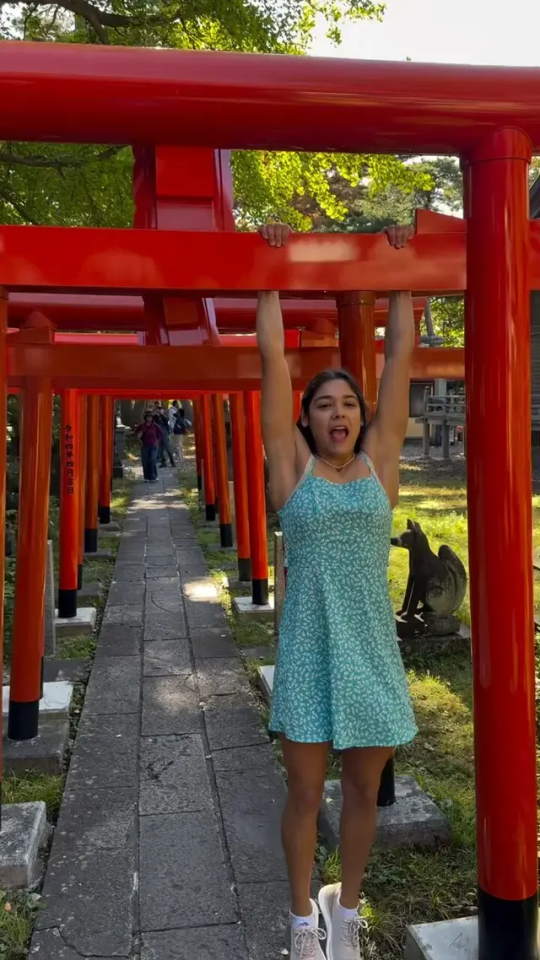



Sean bienvenidos amantes del mundo japonés, a una nueva publicación de actualidad. Dicho esto póngase cómodos que empezamos.
En esta ocasión, vuelvo otra vez a traer malas noticias sobre el país del sol naciente. Veo que la gente es muy burra y muy payasa por intentar ganar unos asquerosos likes de migrantes, comentarios, entre otras cosas, a través de la red social y dárselas de importante, de decir:Mira dónde he estado, mira lo que he hecho, solo con tal de llevar la atención y hacer el ridículo. Este tipo de gentuza no les importa, no les interesa la historia ni la cultura ni nada en absoluto, nada que tenga que ver con alguno de estos puntos mencionados anteriormente o algo similar; solo van a estos países, sobre todo al país desconocido o a países circundantes, porque están de moda y porque está en la sensación máxima ir para quedar bien y decir ante tus amigos o conocidos, Mirad dónde he ido y tú no. Por culpa de gentuza y de peña así, determinadas áreas del país del sol naciente están siendo vetadas para los turistas. Esto no quiere decir que los japoneses odien a los extranjeros y menos a los turistas; lo que odian son determinadas acciones o actitudes de dichos turistas, como subirse, por ejemplo, a la estatua de un perro icónico llamado Hachiko en frente de a estación de Shibuya.
-
O por ejemplo como el caso de la chilena inculta e inmadura por hacer el postureo en un lugar sagrado para los japoneses para mí es una calumnia y una blasfemia lo que ha hecho la chilena y además para mí es un insulto lo que los turistas están llegando a hacer en Japón convirtiéndolo en un parque de atracciones por favor parad ya de hacer el gilipollas o el imbécil en un país dejad que vaya gente que realmente valore y aprecie cultura, valores costumbres de un país. Temo postear esto en 2025; la raza humana da vergüenza.
-
Espero que os haya gustado y nos vemos en próximas publicaciones. Que pasen una buena semana.
-
日本世界を愛する皆さん、最新刊へようこそ。そうは言っても、安心して始めましょう。
-
この機会に、私は日出ずる国についての悪い知らせを伝えるために再び戻ってきました。ソーシャルネットワークを通じて、とりわけ移民から嫌な「いいね」やコメントを獲得しようとして、偉そうなふりをして、「私がどこにいたのか、私がどうなったのか見てください」と言う人々は、非常に愚かで非常にピエロであることがわかります。注目を集めて自分を馬鹿にするためだけにやったのです。このタイプの人々は、歴史や文化などにはまったく興味がなく、上で述べた点や同様のものとは何の関係もありません。彼らがこれらの国、特に未知の国や周辺国に行くのは、ファッショナブルだからであり、見栄えを良くして友人や知人に「ほら、私はどこに行ったのに、あなたはどこに行ったの?」と言うのが究極の感覚だからです。 t.このような暴徒や集団のせいで、日出ずる国の特定の地域は観光客の立ち入りが禁止されています。これは、日本人が外国人を嫌い、さらには観光客を嫌っているという意味ではありません。彼らが嫌うのは、例えば渋谷駅前にあるハチ公と呼ばれる象徴的な犬の像に登るなど、観光客の特定の行動や態度だ。
-
あるいは、例えば、日本人の神聖な場所でポーズをとった無学で未熟なチリ人女性の事件のように、私にとってチリ人女性の行為は中傷であり冒涜であり、また私にとって観光客の行為は侮辱である。日本で何をするか、遊園地に変えるか、その国で嫌な奴や馬鹿みたいな行動はやめて、その国の文化、価値観、習慣を本当に大切にして感謝している人たちを去らせてください。 2025 年にこれを投稿するのは怖いです。人類は恥ずべき存在だ。
-
気に入っていただければ幸いです。今後の投稿でお会いしましょう。良い一週間をお過ごしください。
-
Welcome, lovers of the Japanese world, to a new publication of current events. Having said that, make yourself comfortable, we're starting.
-
On this occasion, I am back again with bad news about the country of the rising sun. I see that people are very stupid and very clownish trying to gain some disgusting likes from migrants, comments, among other things, through the social network and acting like they are important, saying: Look where I've been, look what I've done, just to attract attention and make a fool of themselves. These types of scum don't care, they are not interested in history or culture or anything at all, nothing that has to do with any of these points mentioned above or anything similar; they only go to these countries, especially to the unknown country or surrounding countries, because they are fashionable and because it is the ultimate feeling to go there to look good and say to your friends or acquaintances, Look where I've been and you haven't. Because of scum and people like that, certain areas of the country of the rising sun are being banned for tourists. This doesn't mean that the Japanese hate foreigners and even less tourists; what they hate are certain actions or attitudes of said tourists, such as climbing, for example, the statue of an iconic dog called Hachiko in front of Shibuya station.
-
Or for example, like the case of the uneducated and immature Chilean woman for posing in a sacred place for the Japanese. For me, what the Chilean woman has done is slander and blasphemy, and for me, what tourists are doing in Japan by turning it into an amusement park is an insult. Please stop being an idiot or an imbecile in a country. Let people who really value and appreciate the culture, values, and customs of a country go there. I'm afraid to post this in 2025; the human race is shameful.
-
I hope you liked it and I'll see you in future posts. Have a good week.
#日本#japan#歴史#unesco#ユネスコ#kyoto#hachiko#hachiware#photos#photography#japan photos#influencer#culture#geography#education#historyjapan#history#京都#渋谷#ハチ公#アート#インフルエンサー#チリ#教育#文化#art on tumblr#artists on tumblr
124 notes
·
View notes
Text
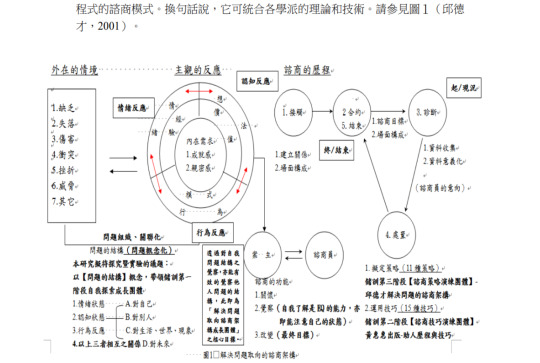
艾里斯理性情緒治療ABC理論-人際溝通實務演練
理性情緒治療是人格理論及心理治療方法的一種,為艾里斯(Albert Ellis)於1955年所創,理性情緒治療簡稱理情治療(RET),也稱為ABC理論。
ABC理論
是Affairs 的字首,代表「事件」的意思
是Belief 的字首,直譯是「信念」的意思,這裡則是指「思考的習慣」、「掌握事物的方法」、「對事件的解讀」
是Consequence 的字首,直譯是「結果」的意思,而這裡的結果指的是,產生什麼樣的「心情」,或是產生什麼樣的「情緒」。
基本假設是:引起人們情緒困擾及行為失常的原因,不是事件的本身,而是人們的非理性信念。它屬於認知行為理論,強調認知在問題行為及情緒困擾形成的過程中所扮演的重要角色地位,因為人對字句的解讀不同,而產生不同的情緒結果,並不是事件使我們產生情緒,而是我們對事件的解讀,使我們產生情緒。
艾里斯認為人們常有的非理性信念可分為三類:
A (事件):代表誘發事件或某種經歷,包括外部事件或內部事件。當事人對誘發事件的信念是影響情緒和行為的關鍵因素。如“我必須把每件事都做得很好且得到每個人的認同與讚美。”
B (信念):代表當事人對誘發事件的信念。這些信念可能是靈活的或僵化的,合理的或不合理的。不合理的信念往往包含絕對化的觀念,例如“應該”、“必須”等。如“別人必須平等地對待我,否則就是不對,我也無法忍受。”
C (結果):代表關於誘發事件的信念所導致的情緒和行為結果。合理信念通常導致適當的結果,而不合理信念則可能導致不適當的結果。如“我想要的東西,就必須立刻地得到。”
RET的治療者使用各種認知、情感與行為的技術,其經常使用的技術有:
1.認知方面:駁斥非理性信念、認知的家庭作業、讀書治療、使用新的自我陳述
2.情感方面:無條件的接納、理性情緒角色演練、示範、自我陳述、想像
3.行為方面:操作制約、自我管理法的原則、系統減敏法、工具制約��生理回饋、鬆弛訓練,以及示範、家庭作業。
理情治療可用於個別諮商也可用於團體諮商,其主要貢獻為:強調綜合折衷的治療練習,如許多認知、情感及行為的技術,開放地融合了其他技巧。同時強調過去的單獨事件,不足以造成情感的失調,而是個人對此事的信念最重要。
改善情緒困擾,「ABCDE 轉念法」(ABCDE reframe)是認知行為治療的關鍵架構,療法則試著調整自己的想法,即“轉念-詹翔霖”
2人分組-3天內1件不愉快的事件
A 現象:
B 心理的想法:
C 結果:
D 反駁現在的想法:
E 以行動加強新的看法:
AI補充學習
亞伯特·艾利斯(Albert Ellis)是一位美國臨床心理學家,他在1955年發展了理性情緒行為療法(Rational Emotive Behavior Therapy,REBT),也被認為是1960年代美國性解放運動的先驅。
艾利斯於1913年9月27日出生在美國匹茲堡的一個猶太人家庭。他在紐約市長大,並在童年時期體弱多病。他對哲學產生興趣,並在16歲時開始閱讀佛陀、老子、古希臘哲學家等作品。這些經歷為他後來的理論探索提供了範例。
理性情緒行為療法:艾利斯於1955年創立了理性情緒行為療法(REBT)。他的基本假設是,引起人們情緒困擾和行為失常的原因不是事件本身,而是人們的非理性信念。REBT屬於認知行為理論,強調認知在問題行為和情緒困擾形成的過程中所扮演的重要角色。
艾利斯被譽為認知行為療法之父,他的理論影響深遠。他提倡幫助人們理解自己的個人哲學(包括信仰)如何導致情感痛苦,並通過理性分析幫助人們改變不合理的信念。他的工作對心理學和心理治療領域產生了深刻的影響。
#詹仁松老師#親職教育講師:先懂孩子再談教–天下無不是的孩子-親職教育講師詹翔霖副教授#詹翔霖副教授#詹翔霖老師#親職教育講師-培養出熊孩子的熊家長-詹翔霖副教授-內灣國小親職講座#艾里斯理性情緒治療ABC理論-人際溝通實務演練#理性情緒治療是人格理論及心理治療方法的一種,為艾里斯(Albert Ellis)於1955年所創,理性情緒治療簡稱理情治療(RET),也稱為ABC理論。#ABC理論#「A」#是Affairs 的字首,代表「事件」的意思#「B」#是Belief 的字首,直譯是「信念」的意思,這裡則是指「思考的習慣」、「掌握事物的方法」、「對事件的解讀」#「C」#是Consequence 的字首,直譯是「結果」的意思,而這裡的結果指的是,產生什麼樣的「心情」,或是產生什麼樣的「情緒」。#基本假設是:引起人們情緒困擾及行為失常的原因,不是事件的本身,而是人們的非理性信念。它屬於認知行為理論,強調認知在問題行為及情緒困擾形成的過程中所扮演的重要角色地位,#艾里斯認為人們常有的非理性信念可分為三類:#A (事件):代表誘發事件或某種經歷,包括外部事件或內部事件。當事人對誘發事件的信念是影響情緒和行為的關鍵因素。如“我必須把每件事都做得很好且得到每個人的認同與讚美。”#B (信念):代表當事人對誘發事件的信念。這些信念可能是靈活的或僵化的,合理的或不合理的。不合理的信念往往包含絕對化的觀念,例如“應該”、“必須”等。如“別人必須平等地對#C (結果):代表關於誘發事件的信念所導致的情緒和行為結果。合理信念通常導致適當的結果,而不合理信念則可能導致不適當的結果。如“我想要的東西,就必須立刻地得到。”#RET的治療者使用各種認知、情感與行為的技術,其經常使用的技術有:#1.認知方面:駁斥非理性信念、認知的家庭作業、讀書治療、使用新的自我陳述#2.情感方面:無條件的接納、理性情緒角色演練、示範、自我陳述、想像#3.行為方面:操作制約、自我管理法的原則、系統減敏法、工具制約、生理回饋、鬆弛訓練,以及示範、家庭作業。#理情治療可用於個別諮商也可用於團體諮商,其主要貢獻為:強調綜合折衷的治療練習,如許多認知、情感及行為的技術,開放地融合了其他技巧。同時強調過去的單獨事件,不足以造成情#改善情緒困擾,「ABCDE 轉念法」(ABCDE reframe)是認知行為治療的關鍵架構,療法則試著調整自己的想法,即“轉念-詹翔霖”#2人分組-3天內1件不愉快的事件#A 現象:#B 心理的想法:#C 結果:#D 反駁現在的想法:
0 notes
Quote
このポストを読んで「お兄さん」が頼もしいと思った人は、DV・モラハラ加害者に捕まる可能性が高いです。 日常生活の選択肢に暴力が含まれている人は、あなたにとって望ましくない人にだけ暴力を振るうわけではありません。 あなたへも暴力を振るうようになります。 なお、言うまでもないですが、女性ばかりに絡む大声罵り系の男は論外です。 この「お兄さん」、実は「飲食店の従業員に対して暴力的に振舞う男性」の亜種なんですよ。 電車で迷惑行為をする男性は悪い奴だから攻撃してもよいって認定して、暴力的に振舞っている。 電車内の迷惑行為を止めるためだけなら、ここまで暴力的な対応をする必要はないですから。
Xユーザーの弁護士 柴田収@「毒親絶縁の手引き」絶賛発売中さん
銀座線で女性ばかりに絡む大声罵り系の男と遭遇した時、私の隣の吊り革に捕まっていたお兄さんが「怖いですよね、大丈夫ですよ」って優しく声をかけてくれたんですよ 直後お兄さんは豹変、「自分より弱いやつばっかにイキってんじゃねぇぞ、オラァ!俺に同じことしてみろやァァ!」って迷惑男に突進! 逃げんじゃねえよ、オラァ!って人をかき分けてとっ捕まえてガン詰めの後、次の駅伝そいつを引きずって、お兄さんは颯爽と降りて行きました 本当にありがとうございました!
66 notes
·
View notes
Text
那間公司的業務主管
那天下午我們去了汽旅
由於是個平日的午後 感覺沒什麼人
比我年紀大了點
他說平常跟老婆幾乎沒什麼性愛了
他很紳士很有經驗
溫柔地幫我洗澡 帶我一起泡澡、按摩
全程他的老二都是硬挺的狀態
但是他不急著讓我摸
反而是慢慢開始接觸我
在浴缸裡抱著我讓我躺在他懷中
手摸遍我的全身 但沒有直接玩性器官
這真的讓人更加搔癢難耐
被抱著到了床上
整個人先是被摸遍了全身
也沒有直接刺激乳房或是陰部
但已經讓我濕潤到不行
身體不受控想要撫摸他的肉棒
他也只讓我稍微摸一下就繼續品嘗我的身體
真的是品嘗
每個部位他都舔吻
我整個人已經是極度發情的狀態
女人被男人挑逗到這種程度
真的真的只渴求被好好抽插
他真的很會
他甚至讓我主動說出
"想要吃肉棒 餵我" 這樣的話
於是我們用了69的姿勢互相為對方口交
他把我的陰唇掰開 舌頭攪進穴肉內
舒服的快感讓我用力深含著他的硬屌
他的肉棒被我吃到整根濕淋淋 跟我的小穴一樣
然後他就像變了個人
快速帶好套套後把我緊緊壓住直接深入抽插
整個人趴在我的身上用力發洩
他的肉棒插得好深 感覺把我的陰道頂到最深
我的雙腿也緊緊夾住他的腰
因為是在汽旅 可以不用顧慮放聲淫叫
(沒錯 我們之前有過一些其他程度上的接觸了 有空再分享)
我想要帶給他跟我做愛的快感
想要讓他覺得上我比上他的老婆還要爽
於是我徹底讓他享受我的身體
讓他釋放男人的原始慾望
他讓我雙腿趴跪著夾緊
他在我身後狂野地抽送著
每一下都像是要把肉棒塞進我的身體深處那樣
房間裡充斥著我們交配的性愛聲
在上班日的午後盡情享受著短暫的慾望
他射精時插得更深更用力了
後來第二輪
被他抱起來抽插
他有點厚實 我很小隻 整個人像是玩偶般被他盡情搞弄
他的前戲很溫柔 抽插時很瘋狂
感覺像是在宣洩在老婆身上找不到的慾望釋放
我很滿足 不只是身體上的刺激
更多的是能讓別人的老公對我如此激情地發洩慾望
總算是讓他交配了
之前好幾次都處在激情接觸的邊緣
這次終於有機會能交合
他還說
可能只有我能讓他的老二如此想要了
---
如果我開贊助功能
大家會想要支持嗎
65 notes
·
View notes
Text
Quirk counseling: canon, the cultural references and what we can guess from this all (now with the bit about Chap. 431)
So, a recent ask I received pushed me to dig more into Quirk counseling, in hope I could offer better information about it.
Also thanks to @poppy5991 who helped me to expand the overmentioned ask adding to it things I forgot to mention. Hopefully this time I've covered things better. If not, I apologize.
2024-12-05 edit: As Horikoshi added a bit about Quirk counseling in Chap. 431 I've expanded this post to include that too. You can find it at the bottom of the post under the title "CHAPTER 431 AND WHAT IT TELLS TO US".
LOOKING AT CANON AND WHAT IT TELLS US
There’s not much about Quirk counseling as it gets mentioned, as far as I know, exactly 6 times in the whole 42 volumes (and the anime).
The first time Quirk counseling comes up, is after Shigaraki’s attack in chap. 22... and not much is said.
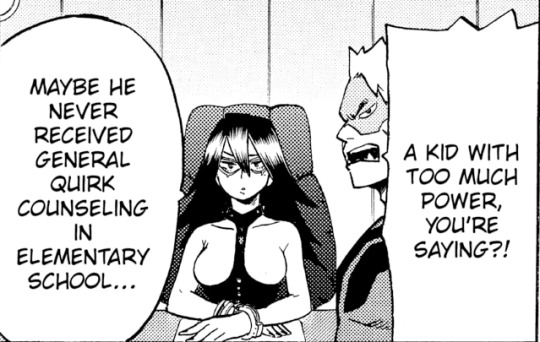
MIDNIGHT ‘Shōgaku-ji no “issei ‘kosei’ COUNSELING” uke tenai no kajira...’ ミッドナイト「小学時の『一斉〝個性〟カウンセリング 』受けてないのかじら...」 Midnight “Didn’t he receive “universal/mass/simultaneous ‘Quirk’ counseling” in elementary school?” [Chap. 22- Ep. 14]
From what Midnight says we can infer that ‘Issei “kosei” COUNSELING’ [一斉〝個性〟カウンセリング “universal/simultaneous/mass ‘Quirk’ counseling”] is given in elementary school as kind of a group activity or class lesson as ‘issei’ (一斉) generally is used to say “simultaneous”, “all at once”, which should imply all the kids at elementary school (or more likely, all the kids in a class) get it at the same time.
For contest, Midnight brings this up because they think Tomura has too much power and was never taught to ‘control’ it (as in not to use it to do what he wants). So we can guess Quirk counseling would, in their mind, have given Tomura a better grasp of what was allowed to do with his Quirk and what wasn’t (with becoming a Villain being definitely on the ‘Don’t do it’ list).
The discussion about Quirk counseling won’t progress any further.
The next time Quirk counseling is mentioned is in chap. 165.
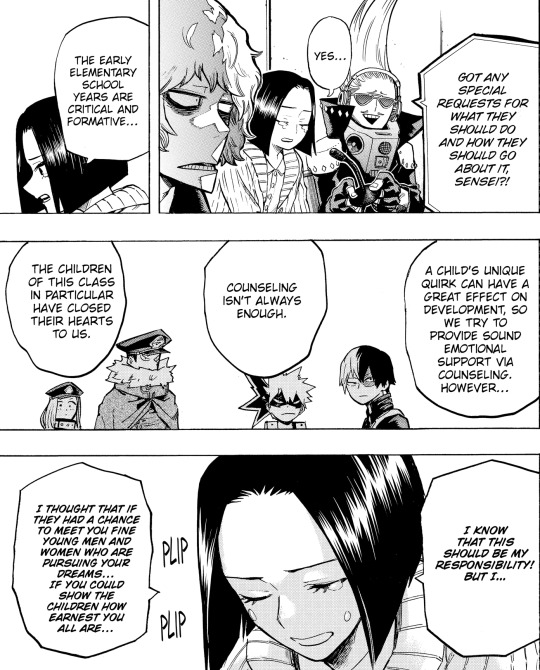
Ikoma Komari ‘Hai… shōgakkō teigakunen wa jinkaku keisei ni oite taisetsuna jiki desu...〝Kosei〟 no chigai ga ōkiku eikyō suru tame COUNSELING o okonai. Sukoyakana seishin o hagukumeru yō SUPPORT suru no desu ga... COUNSELING mo bannōde wa arimasen. Kono CLASS no ko-tachi wa watashi-tachi ni kokoro o tozashite shimaimashita. Watashi no sekinindearu koto wa shōchi shite imasu...! Desuga...! Yume ni mukatte hagende rassharu minasama to fureau koto de massuguna kimochi o omoidasa sete age rarereba…’ 生駒小麿里「はい…小学校低学年は人格形成に於いて大切な時期です...〝個性〟の違いが大きく影響する為カウンセリングを行い。健やかな精神を育めるようサポートするのですが...カウンセリングも万能ではありません。このクラスの子たちは私達に心を閉ざしてしまいました。私の責任であることは承知しています...!ですが...!夢に向かって励んでらっしゃる皆さまと触れ合うことでまっすぐな気持ちを思い出させてあげられれば…」 Ikoma Komari “Yes... the early years of elementary school are an important time for personality development... differences in “Quirk” have a big impact, so we provide counseling. We support them in developing a healthy mind... but counseling is not a panacea. The children in this class have closed their hearts off to us. I know that it is my fault...! But...! I hope that by interacting with all of you who are working hard towards your dreams, we can help them remember their honest feelings...” [Chap. 165-Ep. 79]
Here we don’t talk specifically of Quirk counseling, just of counseling and of how ‘differences in Quirk’ have a big impact on personality development, also adding that counseling is not a fix-it-all. Ironically though, all the kids in the class seems to be the same according to their teachers, ‘mondaiji’ (問題児 “problem children”) who’re always ‘hanko-teki’ (反抗的 “rebellious”/“defiant”) no matter what she does despite them all having very different Quirks, children who have ‘closed their heart’ to them (aka they aren’t listening to them anymore) and feel they’re better than anyone else and it’s clear with this class counseling didn’t work at all.
We jump at chap. 226.
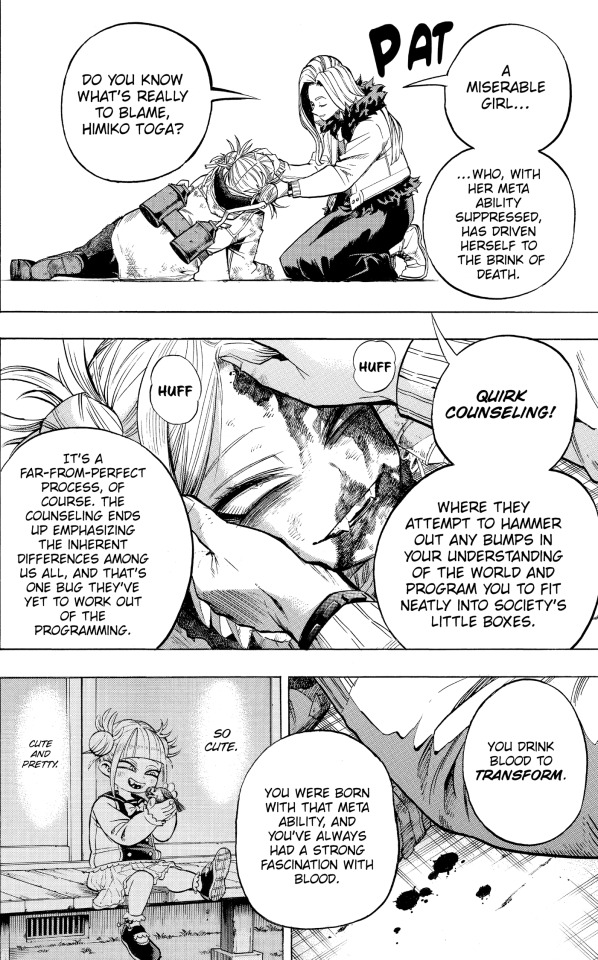
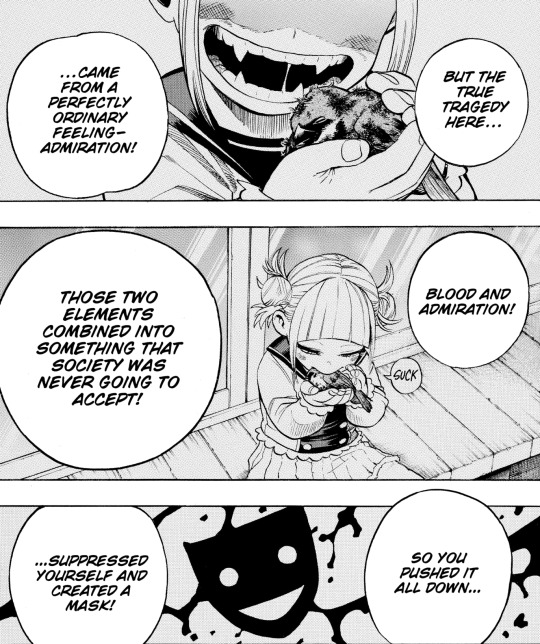
CURIOUS ‘Inō no yokuatsu ni yotte jibun o koroshita fukōna shōjo, sore ga anata nandesho? Toga Himiko. ‘“Kosei” COUNSELING’, jita rikai no yugami o kyōseishi shakaisei no suri awase o hodokosu jōsō kyōiku (read: PROGRAM). Mochiron, kanpekina PROGRAM de wa naishi, kojinsa o yori tsuyoku kanjite shimau to iu mondai o kakaete imasu. Chi o nomi henshin suru, umaretsuki motsu sono inō ni yotte anata wa “chi” ni tsuyoi kyōmi o hikareru yō ni natta. Shikashi shin no fukō wa “akogare” to iu dareshimo ga daku futsū no kanjō. Chi to akogare kamiatte shimatta nitsu no yōso wa tōtei shakai ni ukeire rareru MONO de wa nakatta. Dakara, anata wa FUTA o shita. Jishin o yokuatsu shi kamen o tsukutta.’ キュリオス「異能の抑圧によって自分を殺した不幸な少女、それがあなたなんでしょ?渡我被身子(トガヒミコ)。『〝個性〟カウンセリング』、自他理解の歪みを矯正し社会性の擦り合わせを施す情操教育(プログラム)。もちろん、完璧なプログラムでは無いし、個人差をより強く感じてしまうという問題を抱えています。血を飲み変身する、生まれつき持つその異能によってあなたは〝血〟に強い興味を引かれるようになった。しかし真の不幸は〝憧れ〟という誰しもが抱く普通の感情。血と憧れ噛み合ってしまった2つの要素は到底社会に受け入れられるモノではなかった。だから、あなたはフタをした。自信を抑圧し仮面を作った。」 Curious “You’re an unfortunate girl who killed herself by suppressing her supernatural powers, aren’t you? Toga Himiko. ‘“Quirk” counseling’, it’s an emotional education (read: program) to correct distortions in self-understanding and other things, and to adjust for socialization. Of course, it’s not a perfect program, and it has the problem of making individual differences even more apparent. Your innate ability to transform by drinking blood has made you very interested in “blood”. However, your true misfortune is “admiration”, a normal emotion that anyone can have. The two elements that go together, blood and admiration, were never going to be accepted by society. So you put a lid on it. You suppressed your confidence and made a mask.” [Chap. 226]
Episode 109 should be the one in charge to transpose this scene in animation but episode 109 cut the references to Quirk counseling.
CURIOUS ‘Inō no yokuatsu ni yotte jibun o koroshita fukōna shōjo. Sore ga anata nandesho? Toga Himiko. Umaretsuki motsu sono inō ni yotte anata wa chi ni tsuyoi kyōmi o hikareru yō ni natta. Shikashi, shin no fukō wa akogare to iu dareshimo ga daku futsū no kanjō to chi e no kyōmi, kono futatsu ga kamiatte shimatta koto. Sore wa tōtei shakai ni ukeire rareru MONO de wa nakatta. Dakara, anata wa FUTA o shita. Jishin o yokuatsu shi kamen o tsukutta.’キュリオス「異能の抑圧によって自分を殺した不幸な少女。それがあなたなんでしょ?渡我被身子。生まれつき持つその異能によってあなたは血に強い興味を引かれるようになった。しかし、真の不幸は憧れという誰しもが抱く普通の感情と血への興味、この二つが噛み合ってしまったこと。それは到底社会に受け入れられるモノではなかった。だから、あなたはフタをした。自信を抑圧し仮面を作った。」 Curious “You're the unfortunate girl who killed yourself by suppressing your supernatural powers. That's you, isn't it? Toga Himiko. The supernatural power you were born with has made you very interested in blood. However, your true misfortune was that your fascination with blood and your normal emotion of longing were intertwined. This is something that could never be accepted by society. So you put a lid on it. You suppressed your confidence and made a mask.” [Ep 109]
It’s a bad decision as Quirk counseling was meant to become important later but that’s what they decided to do.
Anyway in the manga there’s something we can work with, if before we were told Quirk counseling helps in developing personality, here it’s clarified the help is aimed at helping people to act ‘normal’, so that they can have a correct perception of themselves as well as socialize and interact correctly, the problem is it suppresses whatever is judged ‘not normal’ in a person and Quirks often generate wild differences between what’s normal for a person and what’s normal for another.
The result of this is that Quirk counseling ends up remarking in an even stronger way the differences between people, by forcing them to suppress feelings that are dictated by their Quirk.
We then jump to chap. 370.
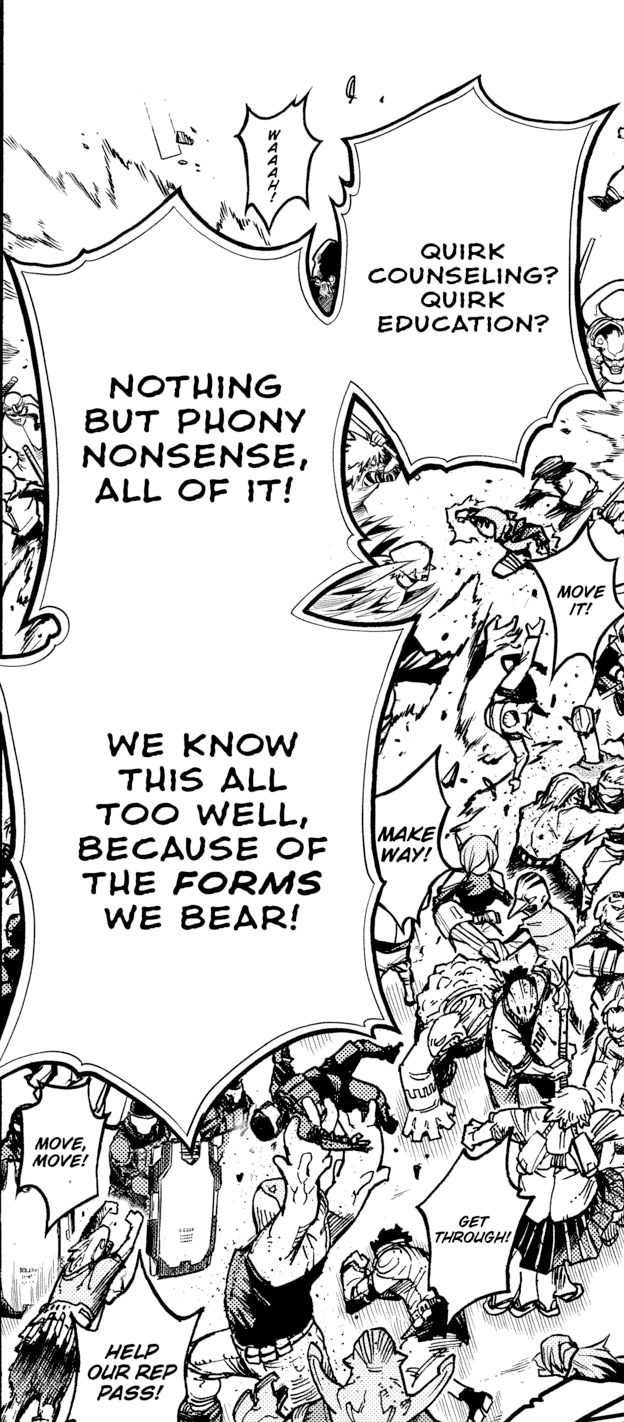
? ‘“Kosei” COUNSELING!” Kosei” kyōiku! Kore ga nise (read: mayakashi) de aru koto o! Wareware wa “katachi” o motte shitte iru!.’ ?「〝個性〟カウンセリング!〝個性〟教育!これが贋(まやかし)である事を!我々は〝形〟を持って知っている!」 ? ““Quirk” counseling! “Quirk” education! This is phony/bogus/sham (read: fake/deception)! We know it due to having this “shape/form”!” [Chap. 370-Ep. 152]
At this point we’ve a nameless heteromorph guy claiming Quirk counseling (along with Quirk education) is basically a sham, it’s not it didn’t work with that class of kids by coincidence, it’s just something that doesn’t really work with Heteromorphs.
While there’s not really an explanation we can guess that, if the point of Quirk counseling is making people ‘normal’, Heteromorphs, who in Japanese are called ‘Igyō’ (異形 “abnormal”), have a hard time with it, since they’re not normal by definition and can’t really change/suppress their ‘not normal’/‘heteromorphic’ traits.
We aren’t told what Heteromorphs are told during Quirk counseling, and the thing is made more complex by how somehow in big cities there’s no discrimination, while in rural villages people still go for ‘chiharai’ (血祓い “blood cleansing”), beating and scarring Heteromorphs who dare to come into contact with not-Heteromorphs, no matter if it’s to save them.
We then jump to chap. 392.
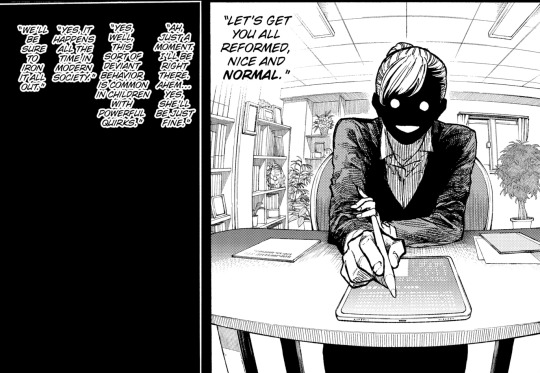
? ‘HAI kyōsei shite ikimashou “futsū” ni. A HAI mō chotto matte kudasai. Sugu sotchi ikimasu. Etto… ē daijōbudesu. Sō desu ne… tsuyoi “kosei” o motsu ko niarigachi na tōsaku desu yo. Kono shakai de wa yoku aru koto desu. Tadashite keshite ikimashou.’ ?「ハイ矯正していきましょう〝普通〟に。あハイもうちょっと待ってください。すぐそっち行きます。えっと…ええ大丈夫です。そうですね…強い〝個性〟を持つ子にありがちな倒錯ですよ。この社会ではよくあることです。正して消していきましょう。」 ? “Yes, let’s correct it and make it “normal”. Ah, yes, please wait a moment. I’ll be there right away. Um... yes, it’s okay. Well... it’s a common perversion among children with strong “Quirks”. It’s common in this society. Let’s correct it and eliminate it.” [Chap. 392]
Here we see a person talking with Himiko’s parents. We aren’t told this person is a Quirk counselor but, I guess, that’s the idea. It’s hard to say if she’s Himiko’s teacher or an external figure, however it makes clear Quirk counseling is more or less what Curious said. That person thought Himiko being fascinated by blood was wrong, she actually calls it a ‘tōsaku’ (倒錯 “perversion”), albeit one she labels as common, and tried to force Himiko to suppress her feelings so she could perceive herself and socialize with the others in a ‘correct’ way.
An interesting difference between the manga and the anime is that in the anime that person’s talk is more streamlined... and we see her also talking with Himiko's parents.


? ‘Hai kyōsei shite ikimashou futsū ni. Sō desu ne… tsuyoi kosei o motsu ko niari-gachina tōsakudesu yo. Kono shakaide wa yoku aru kotodesu. Sei shite keshite ikimashou.’ ?「ハイ矯正していきましょう普通に。そうですね…強い個性を持つ子にありがちな倒錯ですよ。この社会ではよくあることです。正して消していきましょう。」 ? “Yes, let's correct it and make it normal. It's a perversion that is common among children with strong Quirks. It's a common occurrence in this society. Let's correct it and eliminate it.” [Ep. 158]
This might imply that in the manga that person is actually busy with more things at once, she doesn’t have a lot of time to dedicate to Himiko’s parents and therefore she doesn’t have a lot of time to dedicate to Himiko.
Back to the conversation though, regardless of the source, the person talking makes clear that what Himiko does isn’t just something that’s “rude”/“inappropriate” to do in society but that it’s a “perversion”, a common one, yes, but a “perversion” and she says so to her parents who were already worried she wasn’t human.

Chichioya ‘Mō nekko ga!’ 父親「もう根っこが!」 Father “Her core/roots is/are already– (gone/rotten)!”
Hahaoya ‘Ningen ja nai ko un jatta!’ 母親「人間じゃない子産んじゃった!」 Mother “I gave birth to a child that isn’t human!” [Chap. 392-Ep. 158]
And later
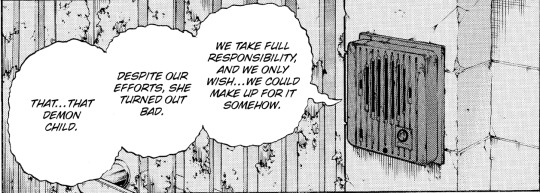
Hahaoya ‘Watashi-tachi ga waruin desu. Mō… tsugunai kirenai desu… ganbatta kedo damedattan desu… ano ko ha… akuma no konan desu.’ 母親「私たちが悪いんです。もう…償い切れないです…頑張ったけど駄目だったんです…あの子は…悪魔の子なんです。」 Mother “It's our fault. We can never make up for it. We tried our best but it was no use. That child is a demon's child.” [Chap. 226]
So Quirk counseling didn’t really reassure her parents nor solved Himiko’s problems. They weren’t going to accept that Himiko could have different feelings from the norm and help her to cope with them correctly, they just wanted to eradicate them from her. As she couldn’t, she was forced to suppress them… and since she couldn’t keep them bottled up forever they eventually exploded and lead her to hurt Saito.
The last time Quirk counseling comes up is at the end of the manga.

? ‘Tsudzuite wa TEAM-UP NEWS. INGENIUM, FROPPY, CREATI soshite URAVITY ga zenkoku no shōgakkō o megutte imasu. Teki (read: VILLAIN) hasseiritsu no genshō ni tomonai katsudō no haba wo hirogeru “HERO”-tachi sono naka demo-- URAVITY no uchidashita “kosei” COUNSELING kakuchō keikaku wa ima mottomo hitsuyō fukaketsuna katsudō to iwa rete imasu.’ ?「続いてはチームアップニュース。インゲニウムフロッピー・クリエティそしてウラビティが全国の小学校を巡っています。敵(ヴィラン)発生率の減少に伴い活動の幅を広げる〝ヒーロー〟たちその中でもーーウラビティの打ち出した〝個性〟カウンセリング拡張計画は今最も必要不可欠な活動と言われています。」 ? “Next up is team-up news. Ingenium, Froppy, Creativity and Uravity are touring elementary schools across the country. As enemy (read: Villain) occurrence rates decrease, the “heroes” are expanding the scope of their activities. Among them, Uravity’s “Quirk” counseling expansion plan is said to be the most essential activity right now.” [Chap. 430]
In this bit it seems that expanding Quirk counseling became a key factor in lowering the occurrence rate of Villains… which, of course, doesn’t seem to be possible since in almost all the other cases in which Quirk counseling was mentioned it turned out it either didn’t work (with the Masegaki elementary school kids) or made matters worse (Himiko and the heteromorphs). Is it a typing mistake as apparently the program already reached all the elementary schools so it didn’t need to be expanded and, anyway, didn’t work? Or does ‘expanding’ refers to actually put more resources and people in Quirk counseling so they can actually devote more time to the kids and help them better? Hard to say.
LOOKING AT THE CULTURAL CONTEST AND WHAT IT TELLS US
Counseling in Japan
While, of course, there’s no Quirk counseling in Japan, by 2006 Japan had school counselors (スクールカウンセラー) available in all the public middle schools. Prior to it though, this work was entrusted to the homeroom teacher (担任教師 ‘Tannin kyōshi’) and often also the school nurse (看護教諭 ‘Kango kyōyu’ ) who were meant to dispense discipline, encourage better conduct, increase motivation, provide career guidance, and offer advice. Those teachers though, were not trained in counseling, and it was often a duty they disliked, often choosing to use their classroom hours for something different than “moral education” depending on their personal educational agenda. Now instead, when problems arise, the teacher or the students or the students’ parents can ask help to the school counselor, which would also offer the plus of being a third party figure, so that they would be people not involved in evaluating students (and therefore have no conflict of interests with them) and would be professional in the field of psychology so as to offer better help to them.
Currently in Japan a school counselor visits a school about once a week to give children advice about various problems they face. School counseling is provided by clinical psychologists, psychiatrists and other professionals with expertise in mental health issues. In addition to advising children, the counselors can advise parents and teachers about how to handle their own day-to-day. A school counselor stands by in a counseling room where he or she listens to children’s problems one-on-one. Children can seek advice about whatever may worry them, such as relations with their friends, their family problems and uncertainties about their future and the counselor will advice them about how they should handle their problems while also talking with their homeroom teachers about what would be the best solution to each problem.
The problems with this system are often that the Clinical Psychologist isn’t also trained as a school counselor which leads with problems of interaction with the teachers, that there is confusion about the role of teachers and school counselors, and that there’s a HUGE stigma of shame at the idea of students or parents seeing a counselor. Much of the counseling that is now conducted in the Japanese schools is remedial with the individual as the focus; an approach that is contrary to the Asian interdependent view of self, an approach that seems to further exacerbate the student’s reluctance to see the school counselor.
It’s possible that Horikoshi, for earlier Quirk counseling, went with mix of the above, with it given both by the class homeroom teacher and by a specialist, or it given by the homeroom teacher only. It's not really clear.
Honne, Tatemae and Giri
Honne (本音 “true sound”) refers to a person's true feelings and desires.
Tatemae (建前 “built in front”, “façade”) refers contrastingly to the behavior and opinions one displays in public.
Giri (義理 “duty”, “obligation”) refers to the social obligations each person have.
Okay, fine, why should we care about these three words? Because Japanese people go to great length to hide their honne (true feelings) and show their tatemae (facade) so as to fulfill their giri (social obligation). They must do everything they can to avoid the disapproval of others, to avoid direct confrontation or disagreement. They’re completely justified in telling white lies to hide their true nature and present their Tatemae, so completely justified they can lie even in trial, that they’re expected to do so (remember when, in chap. 306, a guy said Enji should have just lied in regard to what Touya declared?).
Part of the Quirk counseling plan is clearly based on this, on teaching children how to show a socially acceptable tatemae and hide their own honne. This is what Himiko was taught, that her own fascination for blood was an unacceptable honne and needed to be buried inside herself if she wanted to be ‘normal’. That it was her duty to present herself as ‘normal’ and therefore show solely an acceptable tatemae.
Tōsaku (倒錯 “perversion”) and double meanings
As said before ‘Tōsaku’ means “perversion” and it’s used to describe how Himiko is fascinated by blood… but this is a word also used to describe sexual deviances… and Horikoshi clearly had fun with using words with double meanings in Himiko’s case, for example the onomatopoeia for sucking blood (ちうちう ‘chiuchiu’), sounds also like the onomatopoeia for kissing, Himiko is referred as a ‘ijōsha’ (異常者) which can be translated as “deviant” but also as “pervert” and so on. In short Horikoshi subtly create parallels between Himiko’s love for blood and the fact that Himiko’s way of loving people is not what in Japan is labeled as normal (she also loves girls and not just boys and would like to hurt people she loves). So, while Himiko’s problem of being fascinated with blood might seem distant from the audience as people in real world don’t have a Quirk that makes them fascinated with blood, the parallelism with sexual inclinations bring Himiko back into someone with whom people can relate and, in a way, someone that stands in parallel with Magne.
Heteromorphs, how ‘not normal’ they are meant to be and blood impurity
In English the word ‘Igyō’ (異形) had been translated as “heteromorph” but a better translation is “abnormal” or, more literally “not normal shape”. In a Quirk counseling program that aims at making everyone ‘normal’, who already starts with a name that states they’re not with a normal shape is clearly cut out of the race.
When Shouji talks of what was done to him he mentions ‘chiharai’ (血祓い “blood cleansing”) [Chap. 371] and, in the previous chapter, he was told he had ‘imi chi’ (忌み血 “cursed blood”) [Chap. 370].
Japan is very invested in blood purity, in pre-Meiji era Shinto and Buddhist traditions considered blood (血 ‘chi’) a source of symbolic pollution or ‘kegare’ (穢れ “uncleanness”, “defilement”) with elaborate rituals of avoidance and purification, however, in the Edo period (1603–1868) blood gained the positive meaning of “lineage”/”life force”, overtaking the preceding key metaphors for heredity. This though ended up causing the solidification of a hereditary status system that placed certain groups of people as being permanently “polluted” because they had works tied with blood, like executioners, undertakers, slaughterhouse workers, butchers, and tanners called ‘eta’ (穢多 “great filth”) as well as beggars, street performers, prostitutes, convicted criminals, and the physically disabled among others called ‘hinin’ (非人 “not people”) which together form the group called ‘burakumin’ (部落民 “village people”) and were considered outcasts. Their own blood was considered permanently impure, they were subject to increasingly stricter sanctions that prohibited their contact and mixing with the rest of society by means of restricted residences, economic activities, special clothing, hairstyles, and tattoos and since now blood also was a term used to define lineage, its polluting property also came to be regarded as inheritable and permanent which is why people still don’t want to marry (aka ‘mix blood’) with people whose ancestors were ‘burakumin’.
This was also made worse from the 1900 eugenicist obsession with blood as a medium to modernize the Japanese race and nation.The pure Japanese blood, or “Yamato blood,” was now heralded as a refined superior substance to be protected or enhanced through social programs of reproduction and health also through eugenic marriage counseling services.
This ultimately expanded to include people who had mental illness or familiar with mental illness but also with people who are of not pure Japanese ancestry. We would probably talk about genetics. In Japan it’s referred as blood.
Blood type is, in Japanese mentality, also tied with personality and discrimination can be so high that some would just discriminate people with blood type B or AB as negative stereotyping credits the B types as selfish, and ABs as eccentric and unpredictable and therefore more prone to have a loose morality.
As a result even if Shouji being a Heteromorph is tied to his Quirk and his genes, the story talks about his ‘cursed blood’… and people could refer to it also in relation to how the Todoroki are related to a criminal, Touya/Dabi.
(Plus this also tells you why Himiko's fascination for blood could NEVER be accepted since things related to blood lead to impurity)
While all this doesn’t tell us much about Quirk counseling, it helps to get a better perspective on why blood is mentioned when Heteromorphs are discriminated and how strong discrimination can be based to blood ties, clearly making it something that can’t be overcome with just the discriminated person in question trying to ‘act normal’ by presenting an acceptable ‘tatemae’.
The series leaves unclear what exactly falls into the Heteromorph category because, if the problem is just the shape being not normal, things like having tapes in your arms or engines in your legs, or horns on your head also give you an abnormal shape. Overall we can assume that the more the shape is abnormal and hard to ‘disguise’ as normal, the more one ends up being considered as an Heteromorph (Shouji’s arms are a much more visible ‘abnormal’ trait than Iida’s legs or Sero’s arms).
Just so you know currently Japan lacks any law which prohibits racial, ethnic, or religious discrimination nor has any national human rights institutions. Although racism exists it’s a taboo topic. In the past in the name of national unity, the Japanese government identified and forcefully assimilated marginalized populations, which included indigenous Ryukyuans, Ainu, and other underrepresented groups, imposing assimilation programs in language, culture and religion. Japan considers these ethnic groups as a mere “subgroup” of the Japanese people and therefore synonymous to the Yamato people, and does not recognize them as a minority group with a distinct culture. This is why in the story Heteromorph discrimination isn’t punished but it could also be the basis for why the Quirk counseling doesn’t keep into consideration how Heteromorphs are different but tries to force them too to act ‘normal’.
Quirk
We’re all familiar with the term Quirk that in Japanese is ‘kosei’ (〝個性〟 always written between quotation marks) which, translated literally means “individuality” or “personality”. In a country that is group oriented, values uniformity and thinks standing out is bad, Quirks that instead grant an even more marked ‘individuality’ and that are unique to each person, should feel like a big deal… but also it you tie a superpower with your personality you might get some unpleasant combo that aren’t really meant to be. For example thinks at Tomura and at how his Quirk destroy/decay things. If you think that his Quirk is his ‘personality’ or tied to it, you get the idea Tomura is someone who can only destroy/decay, that has a destructive character, or that who has an animal Quirk has an animal character.
WHERE ALL THIS LEAVES US?
Japanese youths have been fighting so as to have their individuality recognized in various subtle ways but it’s still an ongoing battle. The same goes for the descendant of the Burakumin and for people in the LGBTQ+ community. Sadly most of those topics are kind of considered taboo to discuss in Japanese culture so it’s possible that Horikoshi’s attempt at saying that Quirk counseling would be improved is a subtle message that’s meant to say that in the BNHA world steps would be taken to improve the acceptance of those people and the recognition of each person’s individuality, implying more a change into mentality/education than a change into some institutionalized thing called ‘Quirk counseling’, hence he didn’t need to develop much how it would work.
Of course mine is purely speculation.
Ultimately, if we solely look at the story, how Quirk counseling work/is administered is hardly well explained in the story, and how is reformed is explained even less (saying just it underwent an expansion) as well as why Uraraka, who had no idea of Himiko’s problems with Quirk counseling, decided to focus on it. But it’s likely the cultural context that’s meant to make it work for Japanese readers using solely what little is explained as reference and, for them, improving it, is likely a big step.
For whose of us who are instead cut out from the whole cultural context, there’s just too little to work with and it feels forgettable and confusing.
Okay, my analysis originally was meant to end here but then chapter 431 was released and it talked about Quirk counseling and so I added this extra bit.
CHAPTER 431 AND WHAT IT TELLS TO US
In the volume version only chapter 431 we have a last mention of Quirk counseling, which ‘shows us’ a bit how it’s done now.





Uraraka Ochako ‘Masaka senpai-tachi no tsugō ga tsuku to wa‼ Kitto minna yorokobimasu!’ 麗日お茶子「まさか先輩たちの都合がつくとは‼きっと皆喜びます!」 Uraraka Ochako “I never thought my seniors would be able to make it! I'm sure everyone will be happy!”
Tōgata Mirio ‘Ore nankade ī no kana‼’ 通形ミリオ「俺なんかでいいのかな‼」 Tōgata Mirio “I wonder if I am the right person for this?”
Hadō Nejire ‘Nande sonna koto iu no? Fushigi!’ 波動ねじれ「なんでそんな事言うの?ふしぎ!」 Hadō Nejire “Why would you say that? Strange!”
Amajiki Tamaki ‘URAVITY no “kosei” COUNSELING ni kyōryoku dekiru nante kōei da yo.’ 天喰環「ウラビティの"個性"カウンセリングに協力できるなんて光栄だよ。」 Amajiki Tamaki “It's an honor to help Uravity’s ‘quirk’ counseling.”
Uraraka Ochako ‘Kono gakku no jidō no shiryō-me o tōshite moratta to omoundesu kedo nani yori daiji na no wa COMUNICATION desu. Ikken nan no mondai mo nai ko demo nayami o shimaikonderu koto ga ōi desu. Daishō towazu toku ni katei kankyō nanka shotaimen no otona ni hanaseru hito wa ōkunai desu. Demo jikan o kakereba kanarazu SAIN o dashiteru koto ni kidzukeru node shiryō ni tayori sugizu! Meyasu wa ikkagetsu teido desu ga naiyō shidai de zenzen hendō shimasu. Kazu wa ishiki shinaide otomodachi ni naru tsumori de!’ 麗日お茶子「この学区の児童の資料目を通してもらったと思うんですけど何より大事なのはコミュニケーションです。一見何の問題もない子でも悩みをしまい込んでる事が多いです。大小問わず特に家庭環境なんか初対面の大人に話せる人は多くないです。でも時間をかければ必ずサインを出してる事に気付けるので資料に頼りすぎず!目安は一か月程度ですが内容次第で全然変動します。数は意識しないでお友だちになるつもりで!」 Uraraka Ochako “I think you've looked through the materials about the children in this school district, but the most important thing is communication. Even children who appear to have no problems often keep their worries to themselves. Not many people, can talk to adults they meet for the first time, about problems big or small, especially about their home environment. But if you take your time, you'll definitely notice the signs, so don't rely too much on the materials! The guideline is about a month, but it can vary greatly depending on the content. Don't worry about numbers, just try to make friends!”
Amajiki Tamaki ‘Taihen da ne.’ 天喰環「大変だね。」 Amajiki Tamaki “That's tough.”
Uraraka Ochako ‘Zenzen! Jin'in no SUPPORT wa jūbun desu shi minasan sugoku teinei na oshigoto o sarerun desu yo. HAWKS ga monkashō ni kake attari kakusho ni kyōsan o tsumettari shite kurete “kosei” kyōiku no kankyō wa daibu kaizen sarete kiterundesu.’ 麗日お茶子「全然!人員のサポートは十分ですし皆さんすごく丁寧なお仕事をされるんですよ。ホークスが文科省に掛け合ったり各所に協賛を積めったりしてくれて"個性"教育の環境はだいぶ改善されてきてるんです。」 Uraraka Ochako “Not at all! There is enough staff of support and everyone does a very careful job. Hawks has been negotiating with the Ministry of Education and providing support from various places, and the environment for ‘Quirk’ education has improved considerably.”
Amajiki Tamaki ‘Jā ima wa jibun no tame no jikan mo torerunda?’ 天喰環「じゃあ今は自分の為の時間も取れるんだ?」 Amajiki Tamaki “So now you have time for yourself?”
Uraraka Ochako ‘Gimu toka… sekinin toka nai wake ja nai desu kedo ato kara tsuitekita mono desu. Yorokobu kao o miru no ga suki nandesu. Watashi ga yaritaikoto shitemasu. Tsuyu-chan mo hobo zutto TEAM-UP shite kureteru shi tomodachi to mo aeteru shi zenbu jibun no tame no jikan desu yo!’ 麗日お茶子「義務とか…責任とかないわけじゃないですけど後からついてきたものです。喜ぶ顔を見るのが好きなんです。私がやりたい事してます。梅雨ちゃんもほぼずっとチームアップしてくれてるし友だちとも会えてるし全部 自分の為の時間ですよ!」 Uraraka Ochako “It's not that I don't have obligations or responsibilities, but they came after. I like to see people's happy faces. I'm doing what I want to do. Tsuyu-chan has been teaming up with me almost all the time, I've been able to meet up with my friends, and so it's all time just for myself!” [Chap. 431] Now, I’m not 100% sure if the idea is to always involve Pro Heroes or ‘the supporting staff’ can be composed also of ‘not Pro Hero’ people, but we get a general idea of what the people who decide to take part to the project should do. They read the documents about the kids, they’re encouraged to make friends with them, possibly/likely involving them in a game in which they use their Quirk which will allow them to receive what we can call ‘Quirk positivity’. All this in order to help children to open up and talk about their (Quirk related) problems. This last for around a month then, if no problems are detected (or if they are but they’re solved by that time), the people involved move to another school.
Now… maybe it’s just me but this is basically what was done during the ‘remedial course’ arc with the kids from the Masegaki school, only, they’re given documentation about the kids and, instead than lasting one time, it last one month and it involves Pro Heroes, not Heroes in training who might not be interested in interacting with children but are forced to do it if they want their license.
In this sense the whole ‘expansion’ thing of chapter 430 finds it’s explanation. Heroes are expanding their activities (aka also taking part to other activities like Uraraka’s Quirk counseling program) and the Quirk counseling program is being expanded as well as now its scope isn’t anymore to just help children to fit into the standards of normalcy society created but to offer them Quirk positivity and to create a connection so that THE CHILDREN will be willing to talk about their problems with Quirk and with their family.
Storywise it’s a pity the original characters involved in the ‘remedial course’ arc aren’t mentioned as being involved in all this, especially Shouto (who not only had an extremely troublesome Quirk related family situation plus a brother with problems with his Quirk who almost killed himself, was targeted by a Villain, became a Villain and eventually died). Yes, we can picture they are, but, as far as canon is concerned, he isn’t mentioned AT ALL, not even as one of the sources of inspiration for how Uraraka’s project is structured (canon also didn’t show Bakugou or Shouto talking about their remedial course with classmates) but okay, this isn’t really related to Quirk counseling.
Now with all those additional info I can talk a bit of something else aka:
REALITY CHECK
Uraraka’s project is nice and well meaning but it’s also very fairytalesque, in the same way as Hawks claiming that Heroes having free time would be a good thing. It’s all well and good and, since BNHA is a tale, I’m sure it’ll work like a charm and if you want to stop reading here and enjoy such a happy world I’ll understand you.
However if you want to know if this will work in the real world…
In the real world, if the request for Heroes were to decrease because there are less Villains (and having less Villains would surely be a good thing), it wouldn’t mean people would hire the same amount of Heroes and keep on paying them just the same, we would simply have more unemployed Heroes or society would self regulate itself by simply giving out less and less Hero licenses. In short, society would NEVER allow Heroes to have more free time, it would just hire less Heroes or, in the very best case, pay them less. Sure, the problem can be solved with Heroes reinventing their job, for example volunteering to take part to Uraraka’s Quirk counseling project so as not to lose their job and their source of income.
With this though, comes a worsening of the main problem I see in Uraraka’s Quirk counseling project.
There is no mention whatsoever that the people involved are TRAINED to spot (Quirk related) psychological problems. Kids with psychological problems (due to their Quirk and family environment reacting badly to their Quirk) aren’t necessarily always showing a villainous behavior or a transgressive behavior (which is what Heroes are trained to spot), they can be acting as ordinary well behaving kids, or be meek or be people pleasers or vivacious but apparently harmless kids.
While it’s true that elementary school kids are generally more direct in their actions and reactions, some of them could have already mastered the fine art of hiding/masking things for fear of repercussions or due to them being educated to lie about certain things or even being made believe in such lies so they don’t even know they’re lying anymore.
Quirks, it’s worth to mention, don’t necessarily manifest at 4, they can manifest as early as their childbirth (see the luminescent baby or AFO himself), and sometimes a child can be born in a house where the ‘Quirk problems’ are caused by the parents’ expectations (think at how Enji wanted his children to have a certain Quirk and inherit his place). In short they might have been forced BY BIRTH to interact with ‘unpleasant’ situations and might have also been forced to learn to cover them up.
Fuyumi for example, lived in a toxic environment but, likely, masked that up well. Himiko took longer at learning to mask it up well, but her Quirk manifested when she was areound 3 or 4 and gave her a really strong instinct, for which she was left with zero family support (actually her parents’ reaction is completely out of proportion, kids at that age do plenty of stupid and gross things and then can grow up perfectly normal provided they’ve normal parents to guide them, there was totally no need to beat Himiko up and panic like that) and yet she learnt to mask it perfectly by the time she was in middle school, possibly even sooner as the journalists couldn’t find early signs and they likely searched for them like starved piranha.
In truth even professionals might miss the signs or might approach children in the wrong manner, causing more troubles than good because it’s a HARD job… so the idea that if completely untrained adult people who just read some data about the children (which might have been written by who already missed the signs or is misinformed about the real situation of the children) were to make friends with them, they would surely get them to open up or would surely notice signs that something is wrong and act in the appropriate manner to fix it is… well… very naïve.
It’s well meaning and it can surely help in some cases but, unless Japan had a REALLY ABNORMAL PROBLEM so that the TINIEST help would make a BIG difference, don’t expect the big change the press is talking about… especially if Heroes who have no more Villains to capture and zero interest in helping kids will be ‘forced’ to join the program so as not to become unemployed.
On the other side the lack of psychological preparation in people can be very well explained with how there’s a strong stigma in Japan regarding psychological problems.
The reason why real life normal counseling is often not used in Japan is because Japanese people don’t want to talk with a Clinical Psychologist (as said before now that’s the specialization a counselor needs to have) so Horikoshi’s ‘hey, but those people are normal, well meaning people, possibly even Heroes kids admire, not psychologists so talking to them doesn’t mean you’ve psychological problems so you can totally open up with them safely’ is meant to address this fear and, of course, it’s better to talk to an untrained person than not to talk at all so in this vein, this could be seen as an ‘improvement’.
I don’t know but I guess this is now really all we have about Quirk counseling.
Said all this, which is likely still an incomplete overview, I hope my ramblings will help people to understand Quirk counseling better. If not, I apologize.
#boku no hero academia#bnha meta#mha meta#bnha spoilers#Toga Himiko#bnha observations#bnha ramblings#Uraraka Ochako#Kayama Nemuri#Ikoma Komari#Kizuki Chitose#Iguchi Shuuichi#Shouji Mezou#Shigaraki Tomura
106 notes
·
View notes